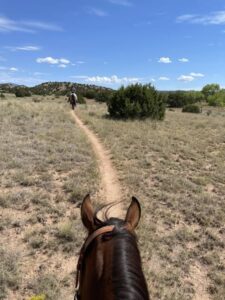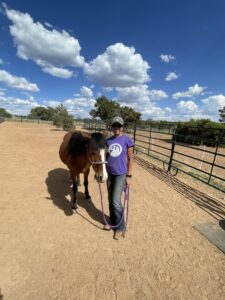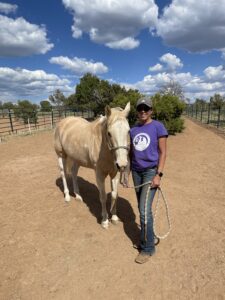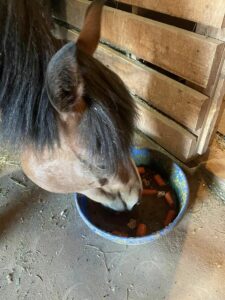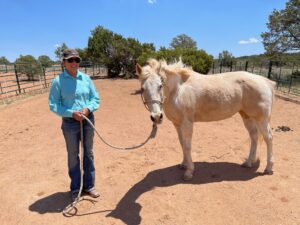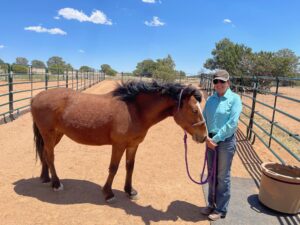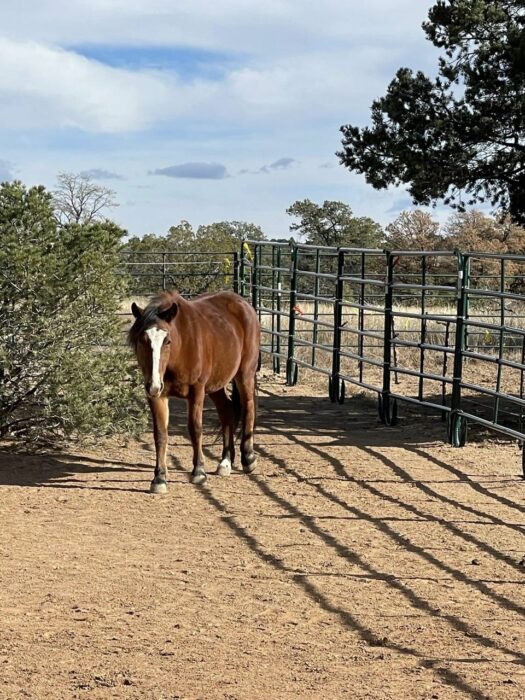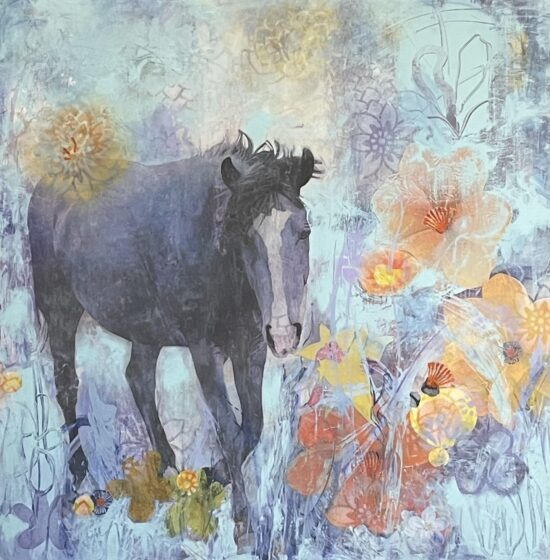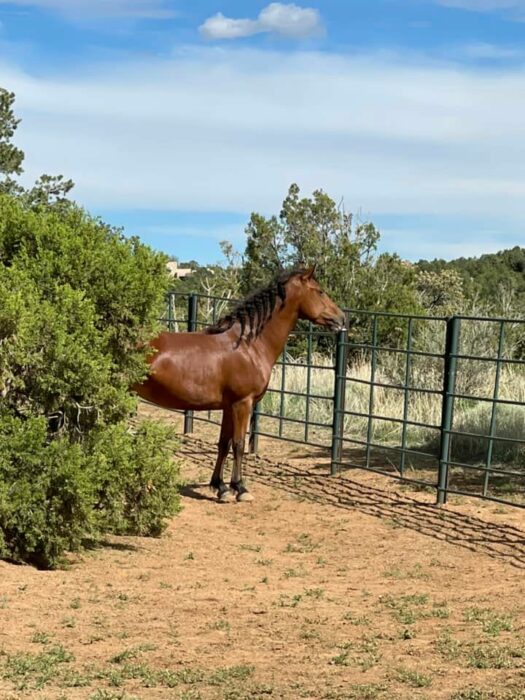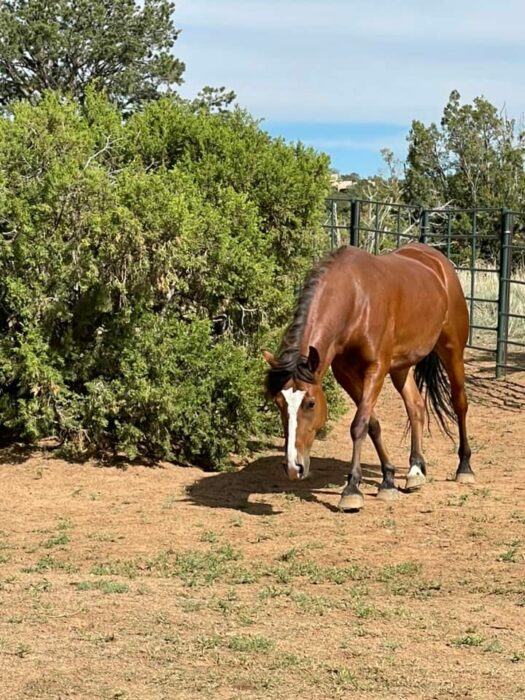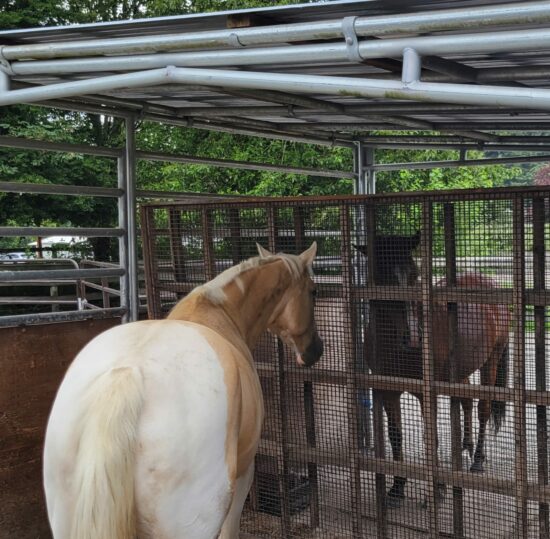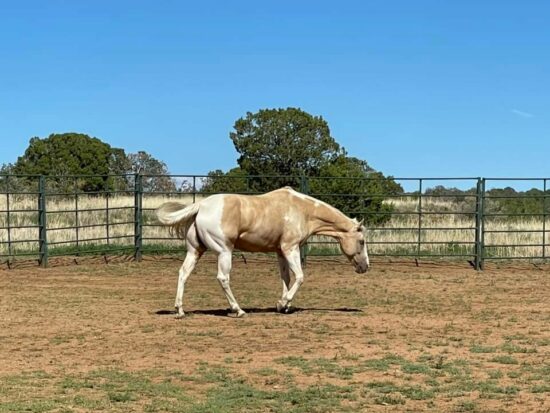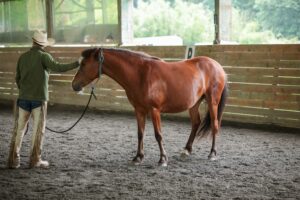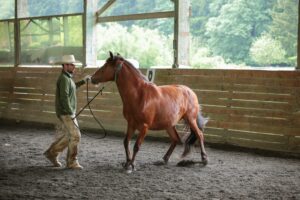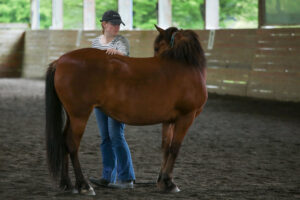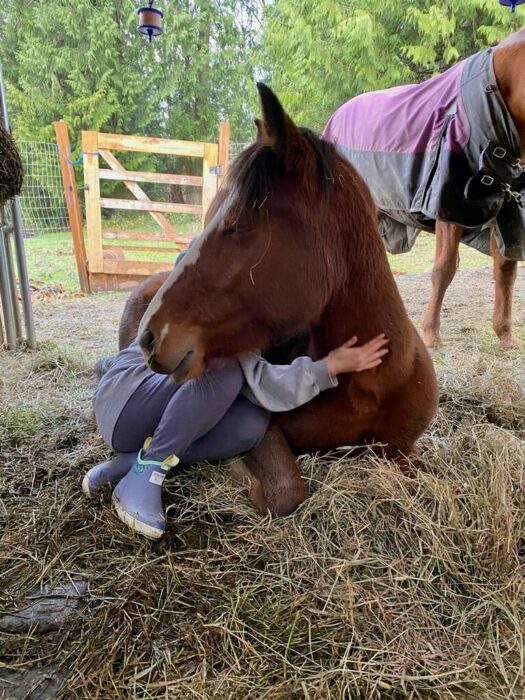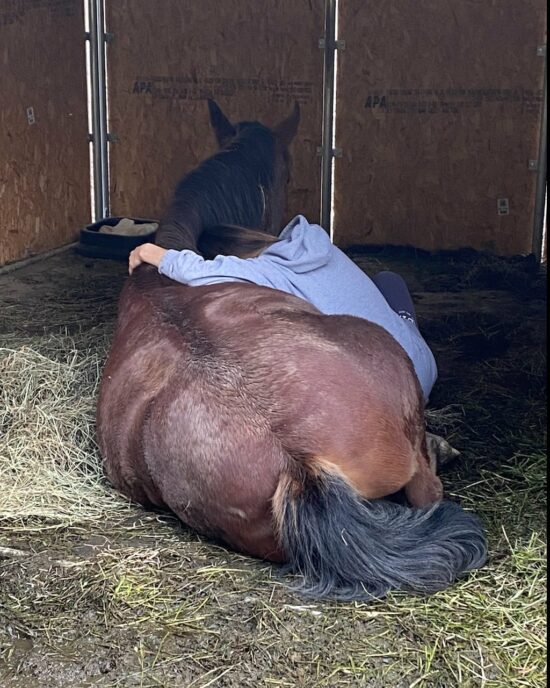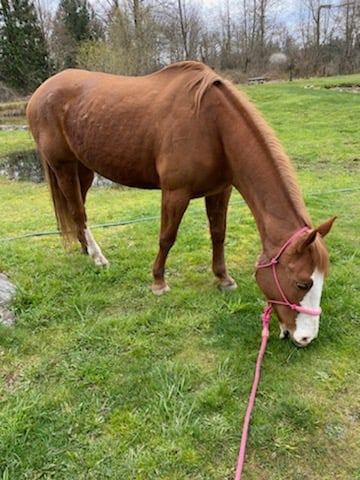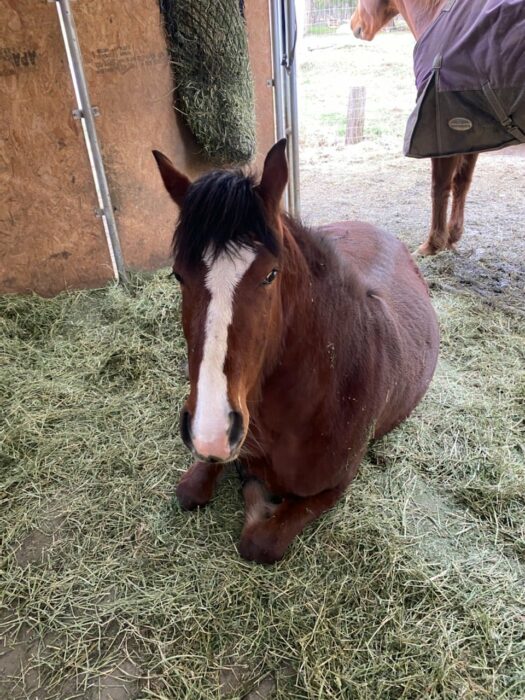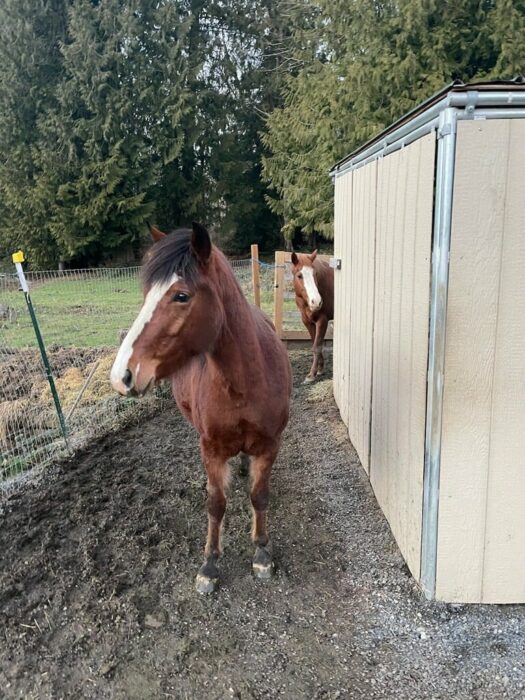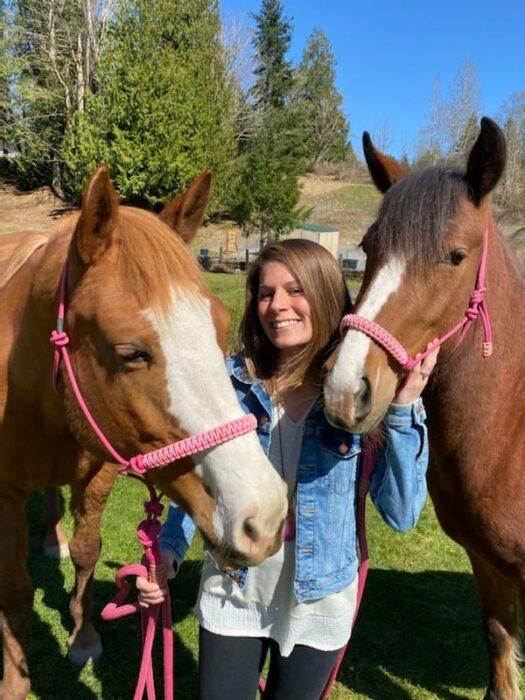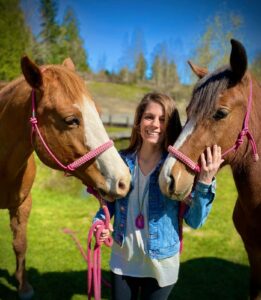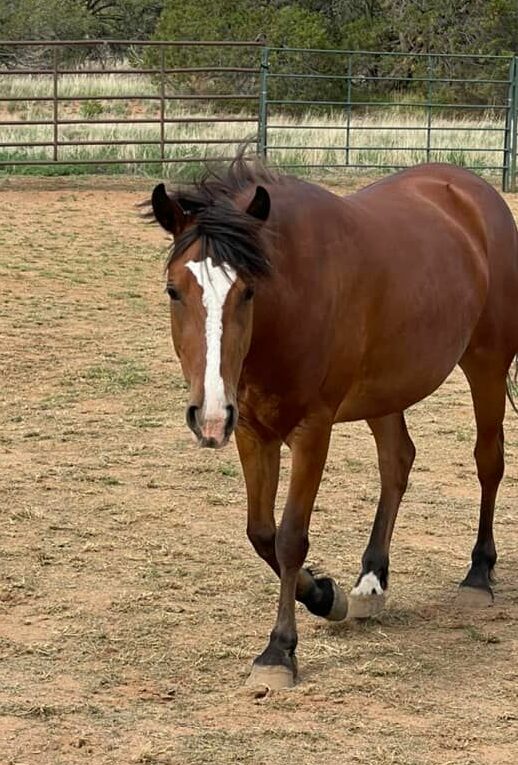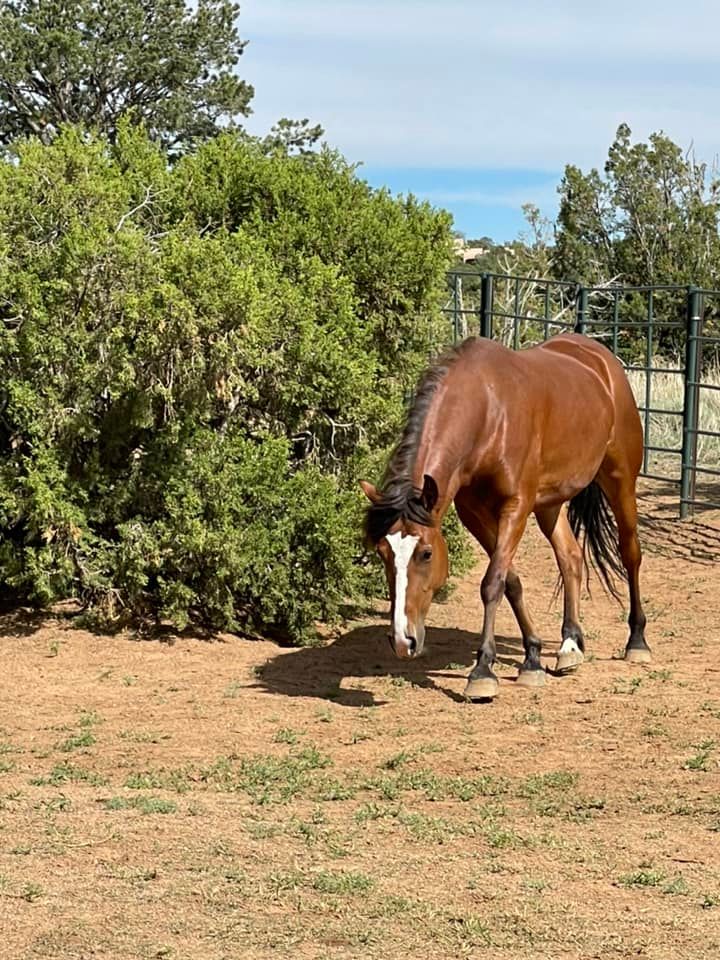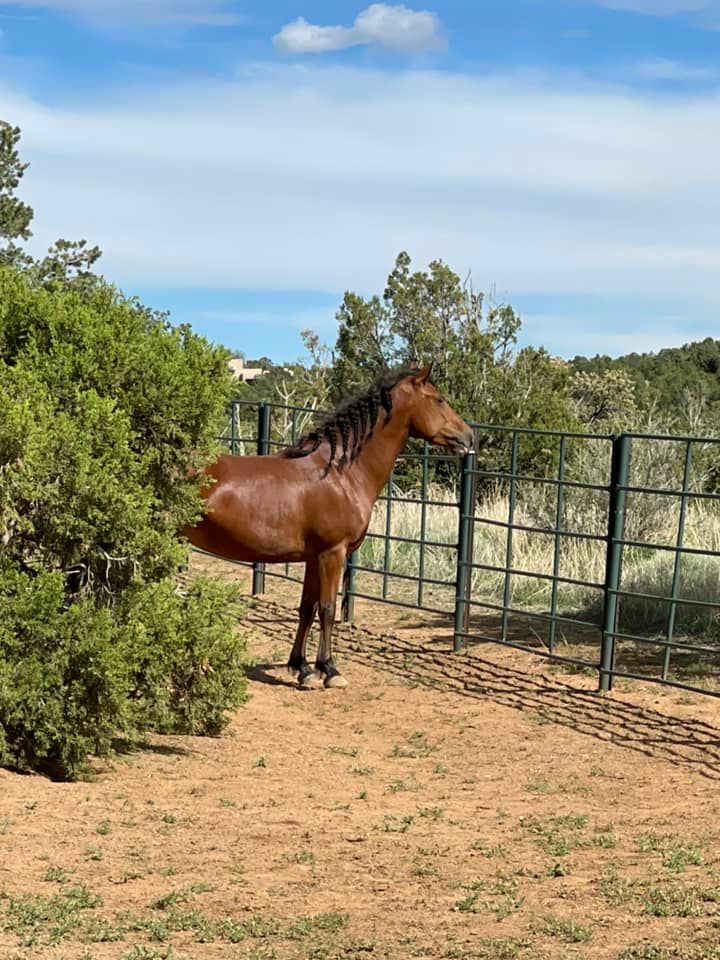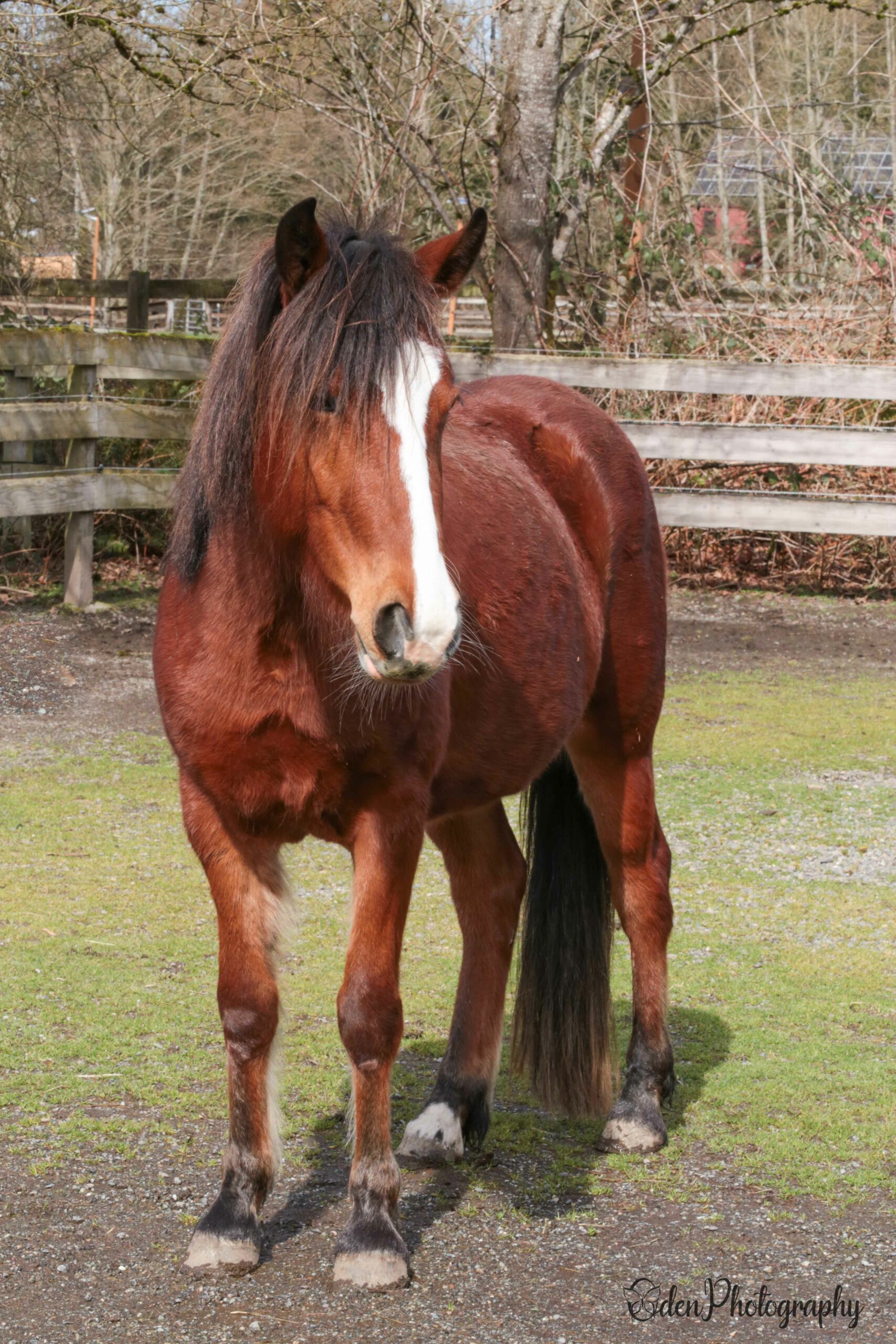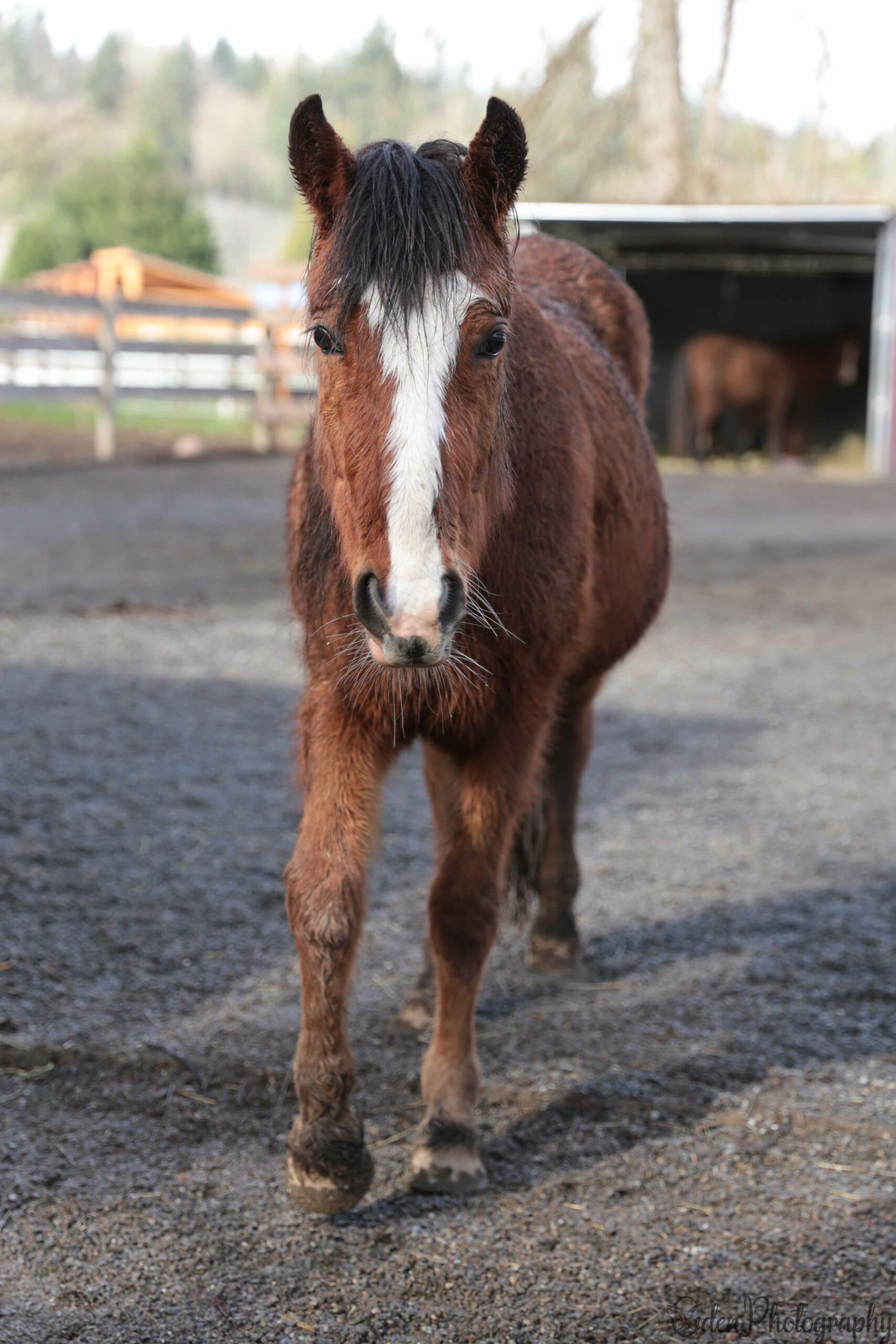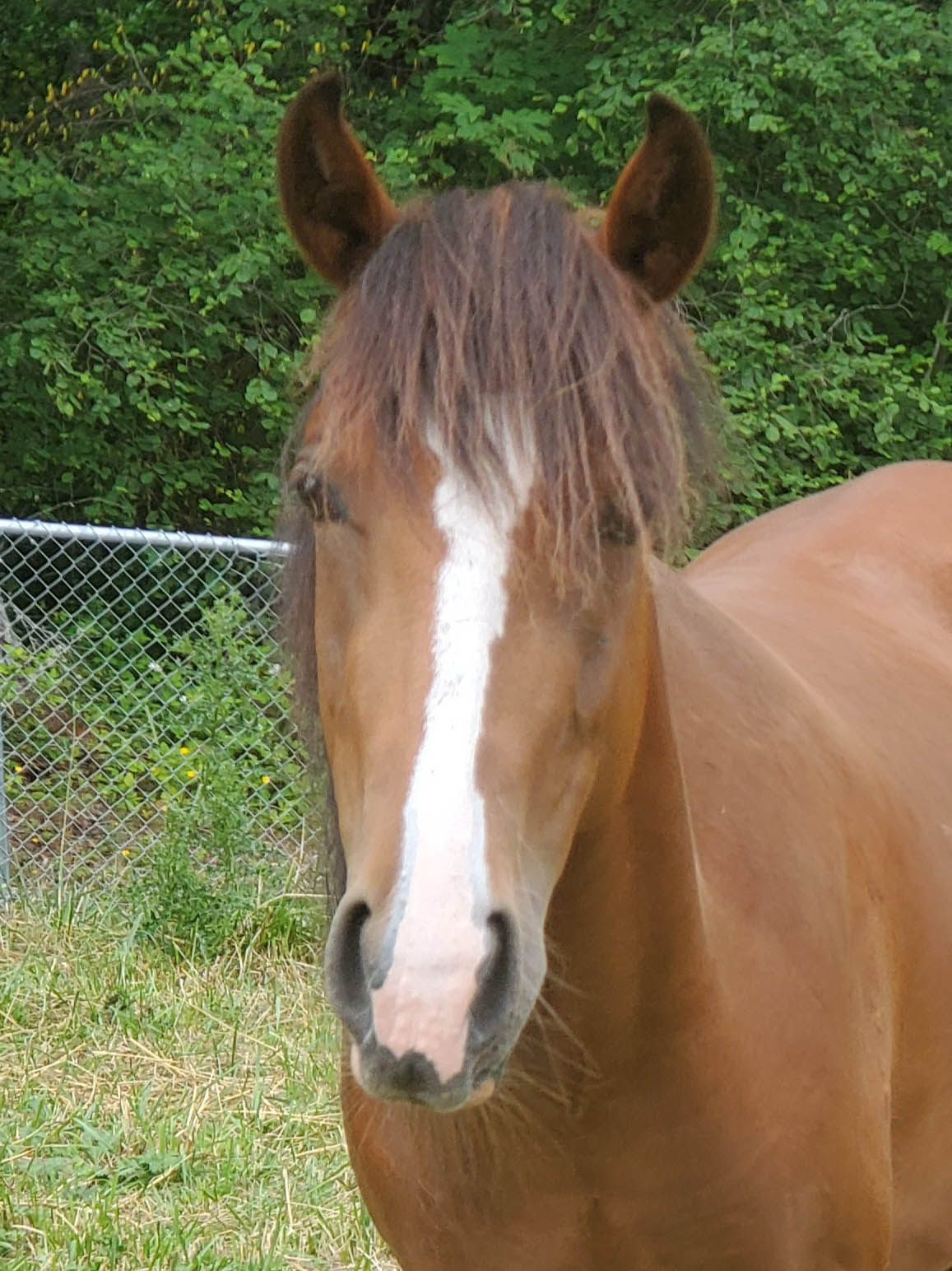Tilt
2017 bay Yakama Reservation mare
Type of Rescue: Animal Control Surrender
Intake Date: 1/1/20
Adoption Date: 7/4/22
Length of Time with SAFE: 2 years, 7 months
ADOPTED!! by Julie
Tilt was one of 24 wild Yakima Reservation horses seized in December 2019 by King County Sheriff’s Office, in cooperation with Regional Animal Services of King County and SAFE. Tilt and four of her herdmates (lovingly called “the wildings” by SAFE staff) came to SAFE to be rehabilitated and spend some quality time with SAFE Horsemanship volunteers. Tilt went to foster to learn more about leading, standing for a farrier, and settling into her life with humans. Tilt was adopted in March 2021 along with another horse friend, Valentine, a 16 year old sweet chestnut mare, but due to unfortunate circumstances, both are again seeking homes as companions. Tilt only stayed at SAFE for a few short months before Julie, swooped her up. Julie had previously adopted Jewel and was looking to add a new friend to her small herd as they moved from Washington to Santa Fe. Tilt scored a fantastic family and new life and we are very excited for her.
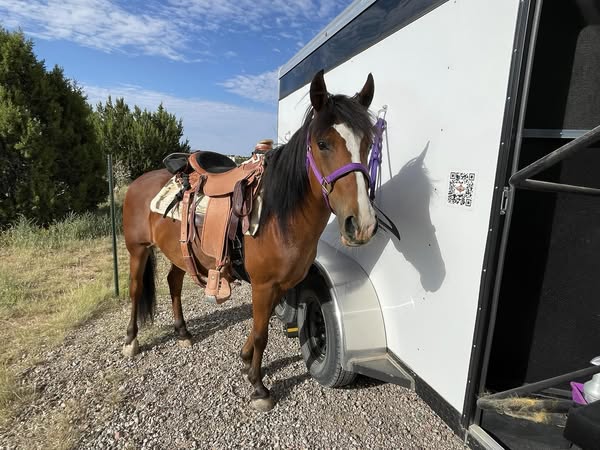
Alumni Update: Tilt (Korra)
Julie shared a milestone for Korra on August 18th:
Another milestone for little Korra. We hauled out to new trails to ride with our farrier and her partner. Korra is TINY compared to the other horses on the ride so we did a whole lotta trotting to keep up. She was a little worked up at the beginning of the ride and there were lots of bikes that were a challenge at first. As the ride went on she settled in. Every time she saw bikes near or far, she whinnied. Silly girl.
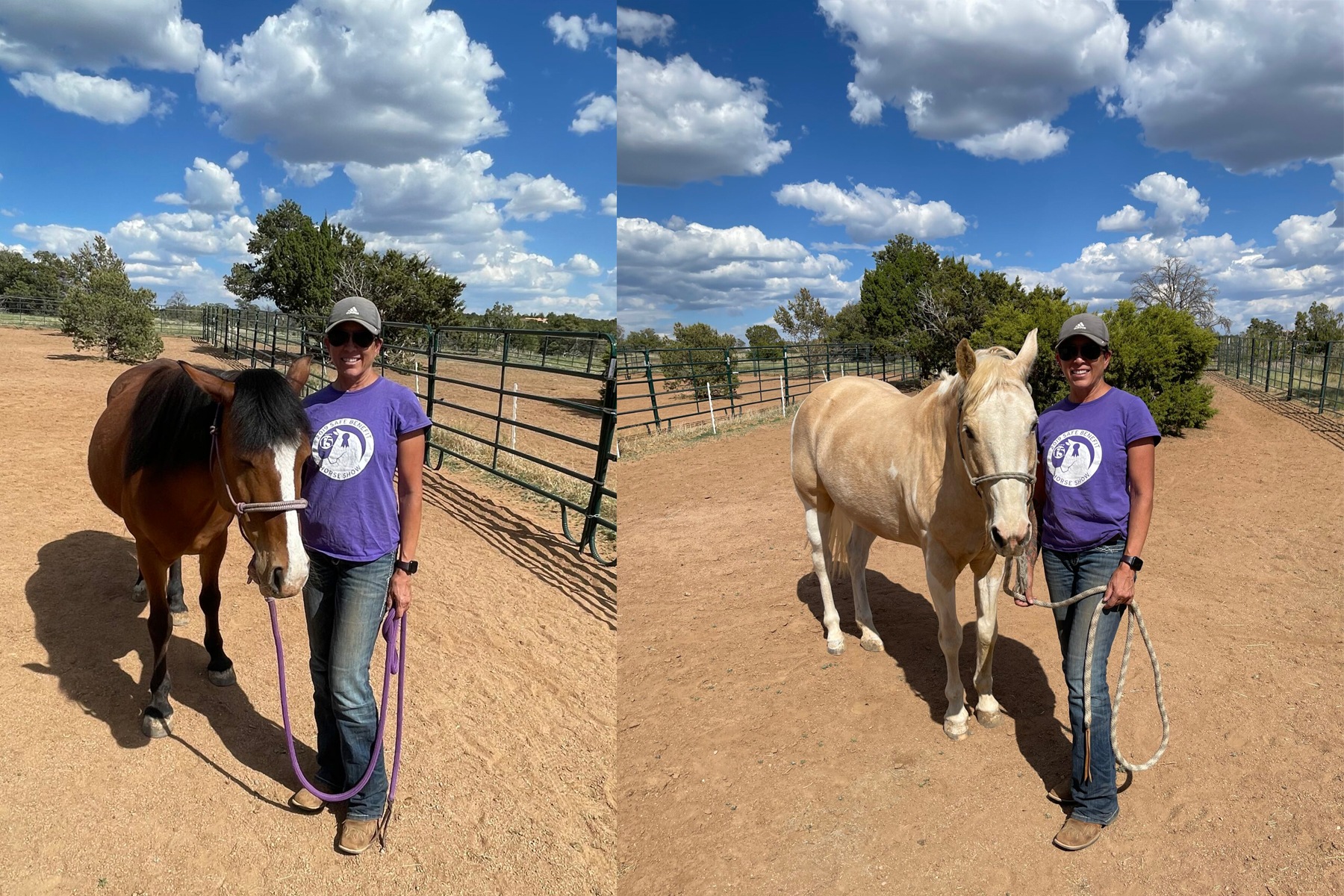
Alumni Update: Jewel and Tilt (Korra)
Julie updated us on how both Jewel and Tilt, now Korra, are doing.
Jewel is 13 now! She is doing well but still has issues with being saddled. I have been able to saddle her on and off but I just get about half a dozen rides on her before she freaks out again. Since I’ve been unsuccessful getting her over her fear, I’m basically starting her over and going REALLY slow this time. I’m working a desensitization program that includes plenty of groundwork and putting as many different things on her back as I can until she just doesn’t care about them. We’re back at a good place with her saddle pad. On to her bareback pad next.
Our favorite thing to do together is trail ride. Jewel LOVES it. But I have to get her over her saddling issue again. Once she’s saddled, everything is fine. Right now we just do our practice and spend time together.
Korra is doing great! She always seems happy. She loves to run and buck and she and Jewel have a game racing each other side by side in their turnouts (they are separate but next to each other). Korra is progressing nicely with rides around the property. She’s ready to start going on longer, more challenging trail rides! It’s nice just to be around Korra. She is so pleasant (yet sassy)! But we are enjoying our riding lessons and discovering new things. Her favorite thing to do is still eating. But she also loves to buck in her turnout.
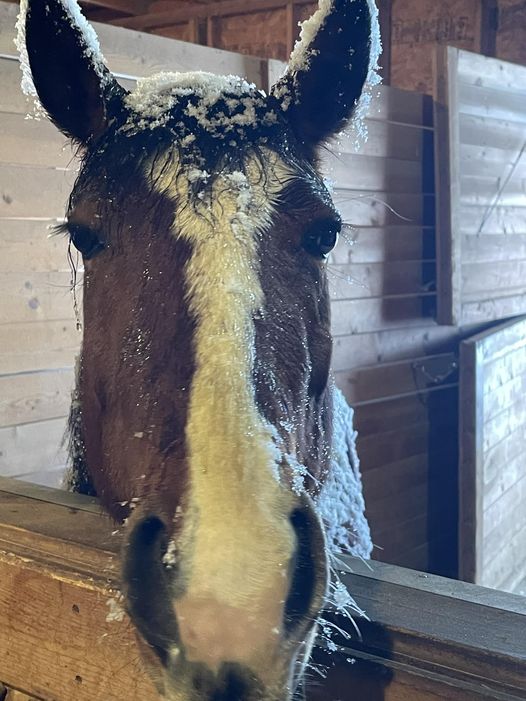
Alumni Update: Tilt
Tilt’s adopter Julie recently wrote:
Much to my dismay, Korra (Tilt) loves to stand out in the snow for lengthy amounts of time.
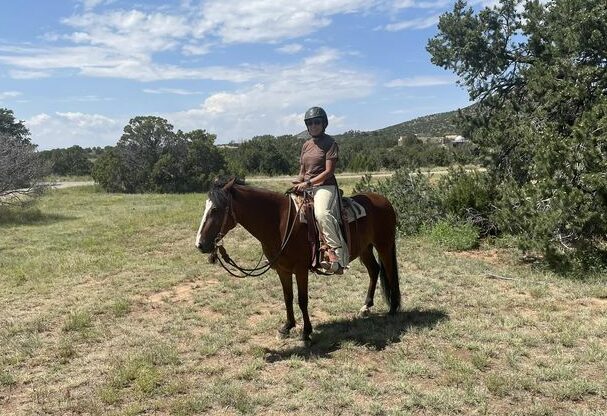
Alumni Update: Tilt (Korra)
Julie recently shared this update:
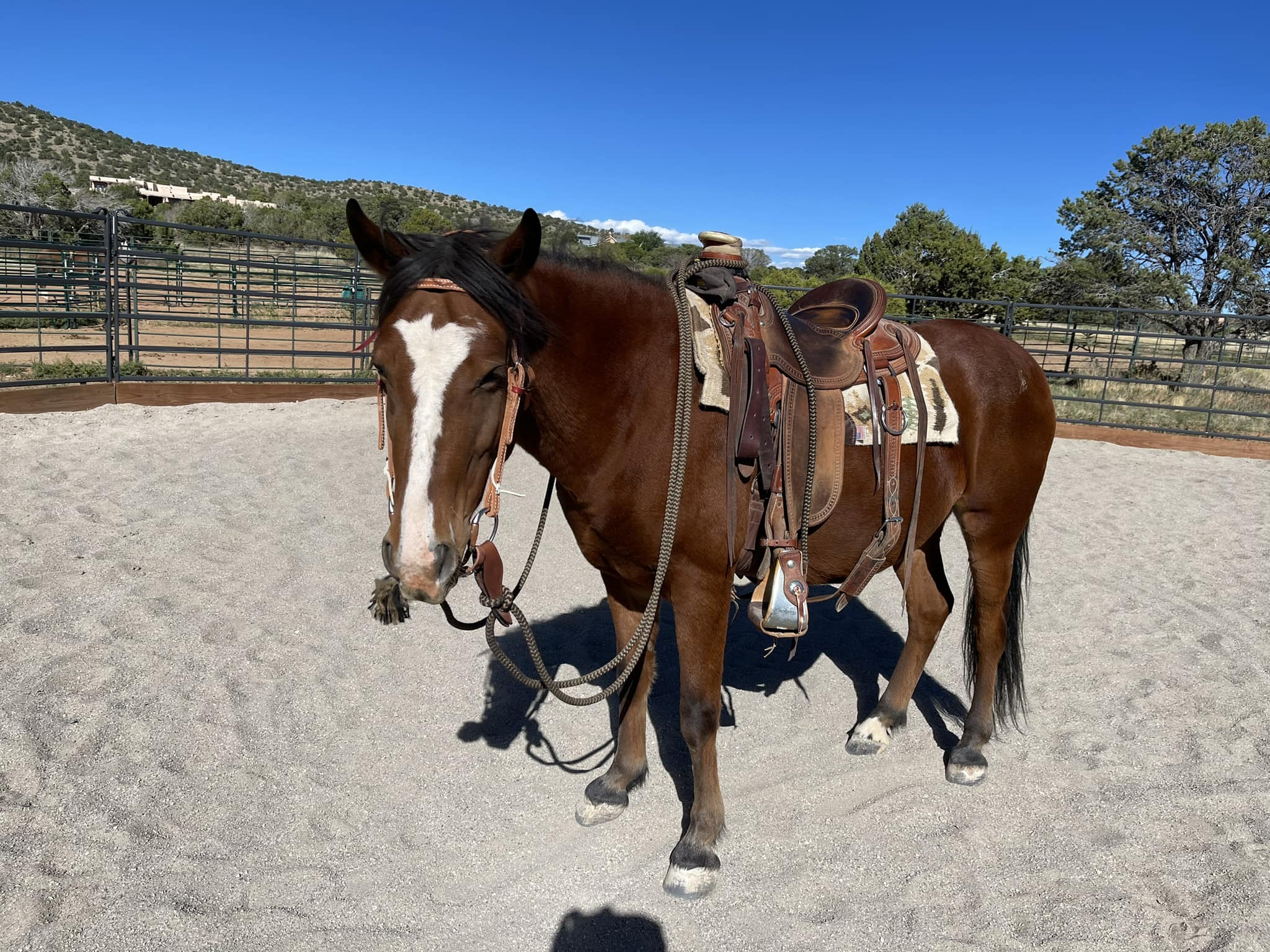
Alumni Update: Tilt (Korra)
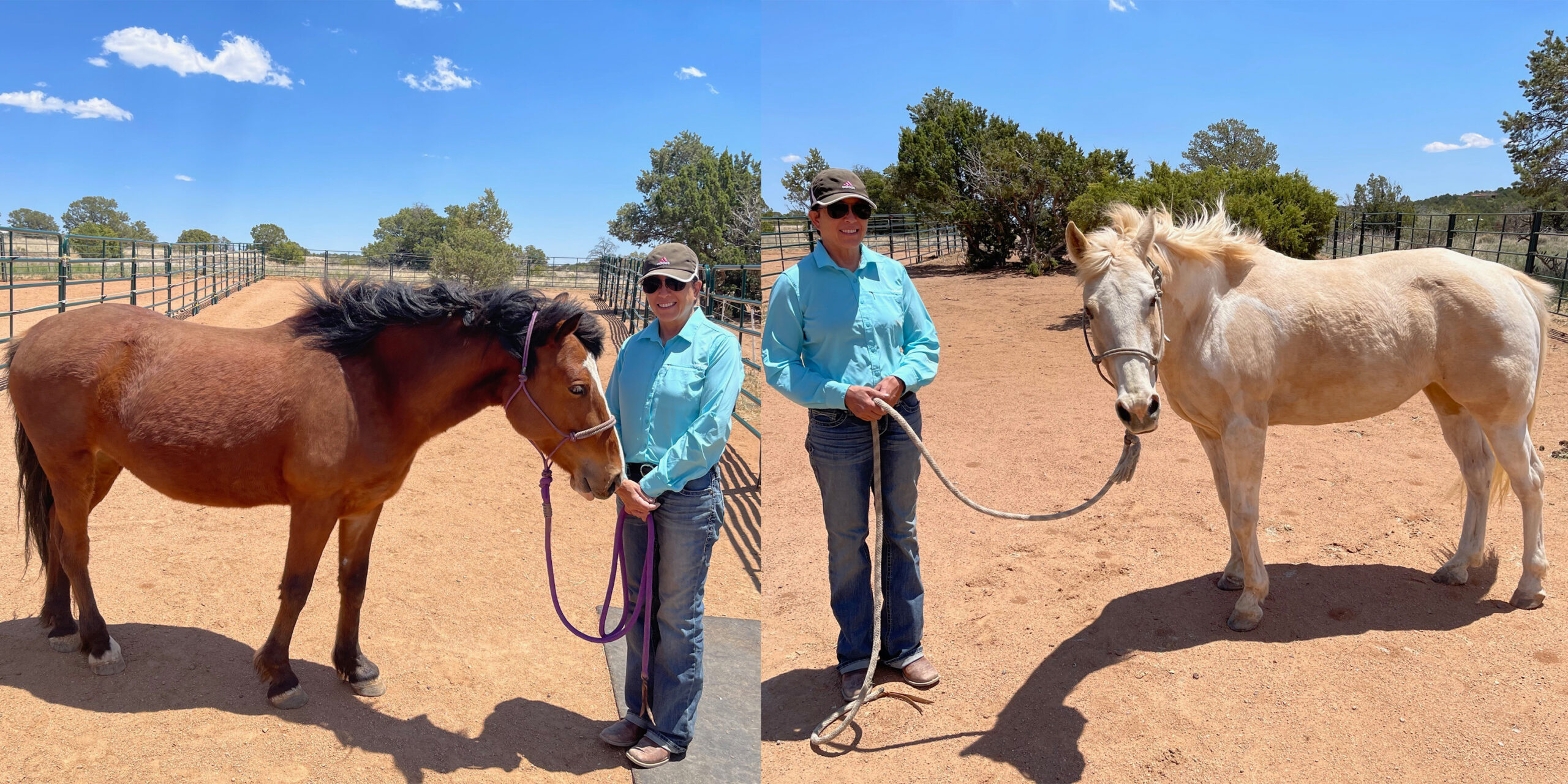
Alumni Update: Jewel and Tilt (Korra)
Jewel is doing well and living a pretty leisurely life right now. She enjoys her feeding schedule (four times per day). Her favorite thing to do is trail riding, which is on hold right now as Julie works through a saddling issue with her.
Tilt (Korra) also likes her leisurely life and same feeding schedule as Jewel. Her favorite thing is eating. Julie is training Korra in the round pen and looks forward to going on their first trail ride soon.
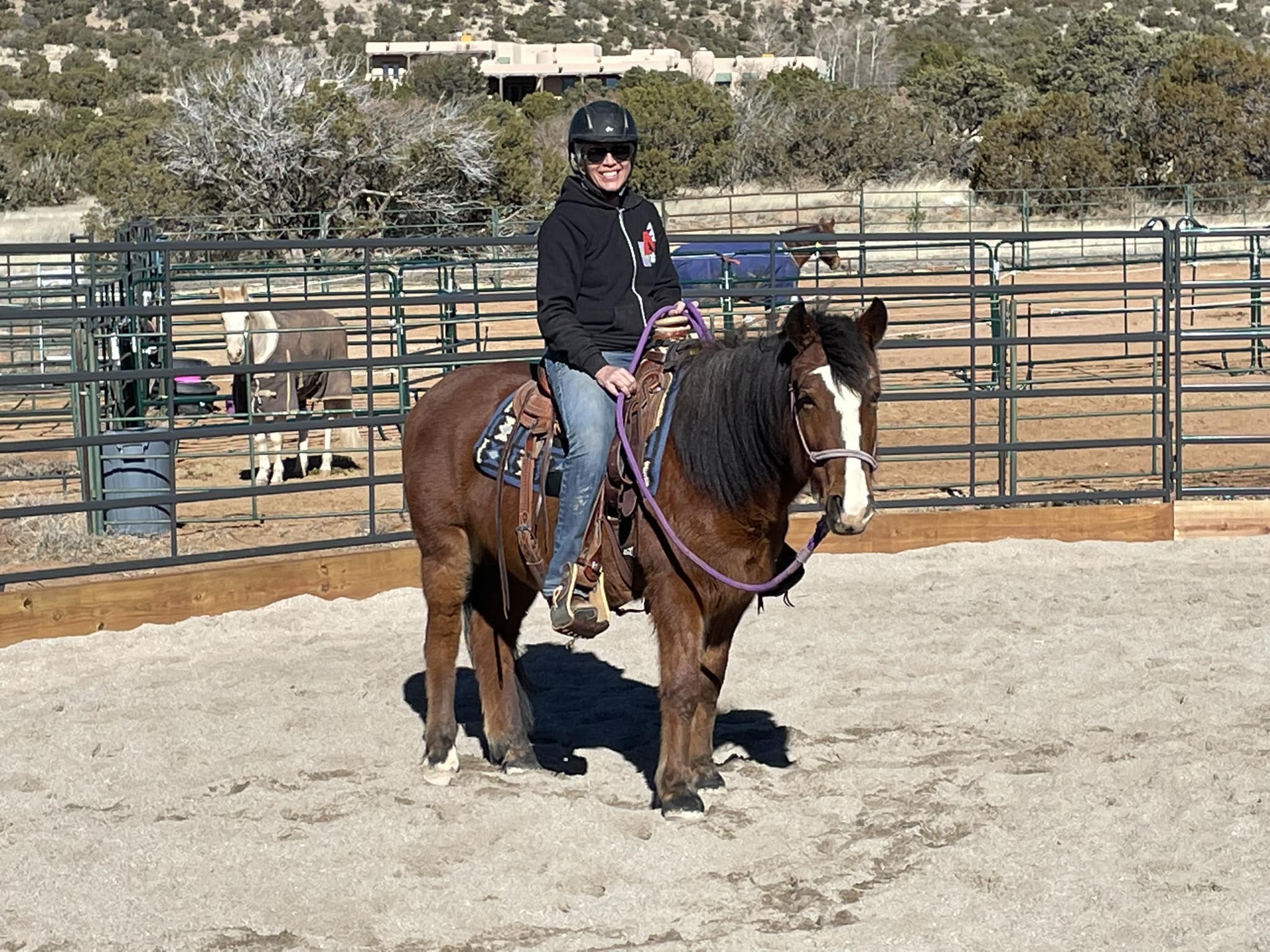
Alumni Update: Tilt
Julie recently sent us an update on Tilt with exciting news!
“Another update from down here in Santa Fe at what we’re calling Desert Jewel Ranch. A huge day for little Korra (formally Tilt). Thanks to Terry Ann Phelps-Peddy, Kaya Mead, Joel Conner and the SAFE horsemanship program, a lot of Buck Brannaman videos and her immensely sweet temperament, Korra had her first ride!! She was awesome. It was not the plan for me to get on her first but she made it so easy. Looking forward to more fun with this little girl. Jewel looking on in the background.”
- Look at this amazing, beautiful painting by Julie’s friend and renowned artist, Colleen Gianatiempo. That’s right. That’s little Korra!
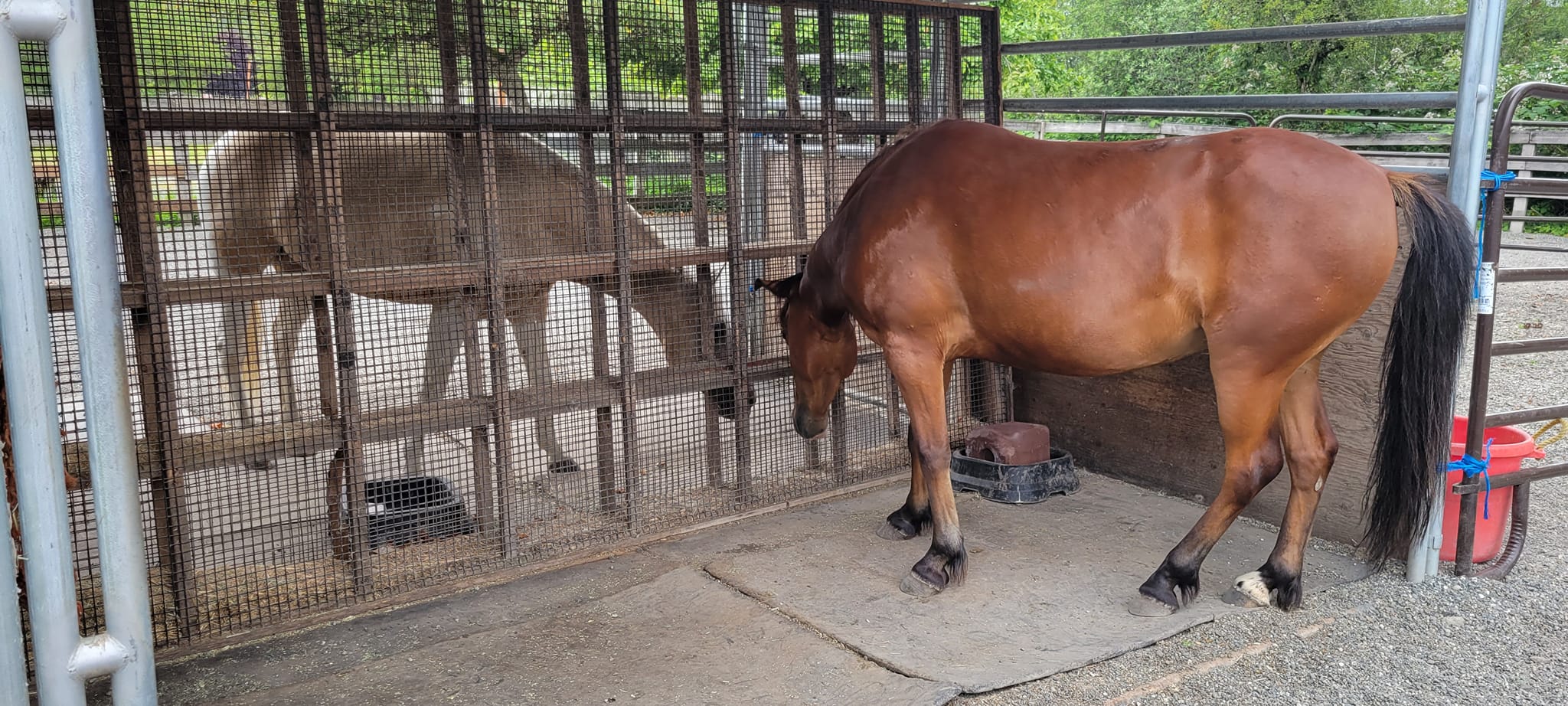
Tilt is Adopted!
Tilt was adopted in March 2021 along with another horse friend, Valentine, a 16 year old sweet chestnut mare, but due to unfortunate circumstances, both made their way back to SAFE. Tilt was only back at SAFE for a few short months before catching the eye of one of our Alumni Adopters, Julie. Julie adopted Jewel back in 2017 and was just across the park from SAFE. Both regularly participated in the Joel Connor clinics every year and we were able to see their abilities and bond grow over time.
Now, Julie and Jewel were moving to Santa Fe. Everyone was happy for her family, but of course sad we wouldn’t see them regularly! But before leaving, Julie wanted to adopt a friend for Jewel and of course she knew the perfect place. Tilt would be the lucky chosen lady to make the big move down south with her soon to be new best friend. The two slowly got acquainted with adjacent paddocks at SAFE before being picked up on July 4th to make the long move home.
Both are settled into their new homes and we look forward to seeing frequent updates from Santa Fe.
Watch below as Terry awarded Julie the “Most Committed Adopter” award at the last Joel Connor clinic Julie was able to participate in. There were tears from both Terry and Julie and some yawns by Jewel.
- Check out the view!
- Jewel and Tilt meet
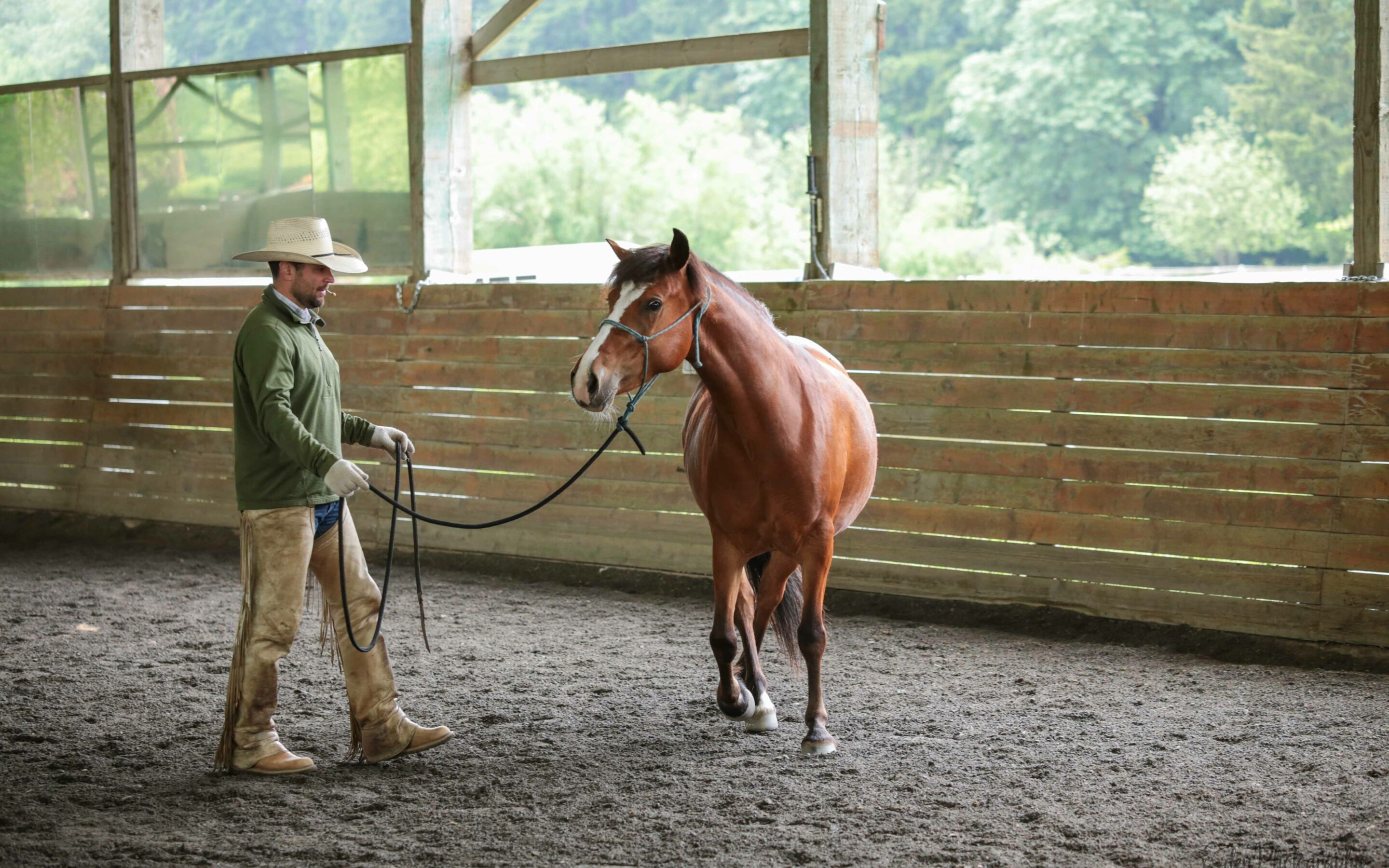
June Joel Conner Clinic Update: Tilt
One of our horsemanship volunteers, Sue, had this to say about working Tilt in the most recent Groundwork Clinic with Tilt:
“I was happy to have the opportunity to do groundwork with Tilt at the June 2022 Joel Conner Clinic. Tilt is a young mare, one of the Fall City 40, who was adopted to a greathome, but sadly had to return to SAFE due to family circumstances. She had probably not done a lot of this work during her time away from us, and had some uncertainty, and braces. She was a bit stuck in front and frightened of the flag when we started.
Tilt is a very smart mare and very eager to please, and I feel like she made a lot of progress over 3 days. As always, I had my own work to do. I really needed to focus on getting a quality hindquarter move, getting her to move her front end appropriately when I stepped in. We also worked hard on getting her more accustomed to the flag, when it is meaningful, and when it is background noise. We were unsure about how she would tie, so we worked on this as well, moving her back and forth with the flag. By the end of this she was more comfortable with the flag, and more willing to stand quietly.
Tilt is a sweet mare with a great future ahead of her. I look forward to hearing about her progress! Thanks to Joel and Tilt for the education.”
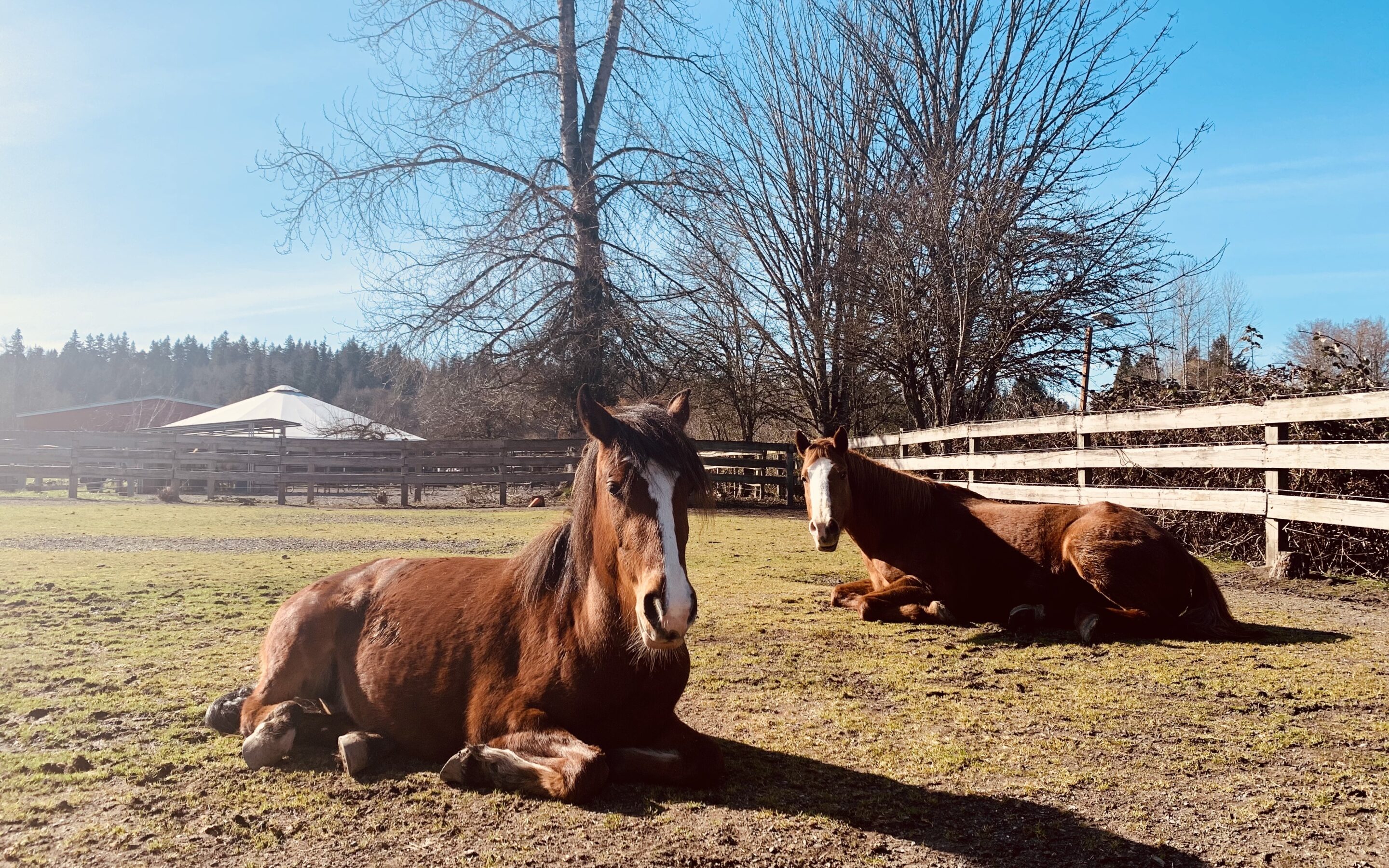
Tilt and Valentine Looking for a New Home
Valentine and Tilt are adopted!
Tilt and Valentine are adopted together! We are happy when we find a home for one horse, but when we get to send off two together, destined to be BFF, that makes us ecstatic! Tilt (now Korra) and Valentine (now Callie) headed to their home with Sophia last month and the two both rolled 10 times when they were first arrived. We think that is a great horse stamp of approval! The property is amazing and they have plans to expand the horse area this spring.
Sophia originally came to SAFE looking for a horse last year. She had plans to adopt our sweet Amelia and a pony friend, Boone. Sadly, Amelia passed away days before she was scheduled to leave for Sophia’s. Like all of is, Sophia was devastated, and needed some time to heal. We are grateful she came back to SAFE to find another horse from us and fell in love with Tilt and Valentine. Now they get to enjoy the good life with Sophia and we could not be happier for them.
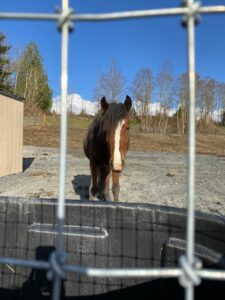
Tilt
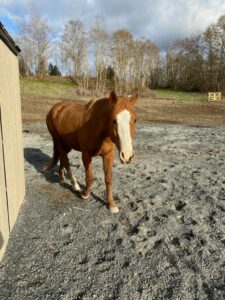
Valentine
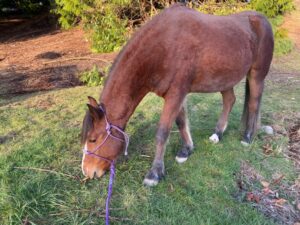
Tilt after a grooming session
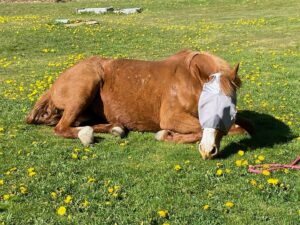
Valentine enjoying a snooze in the sun
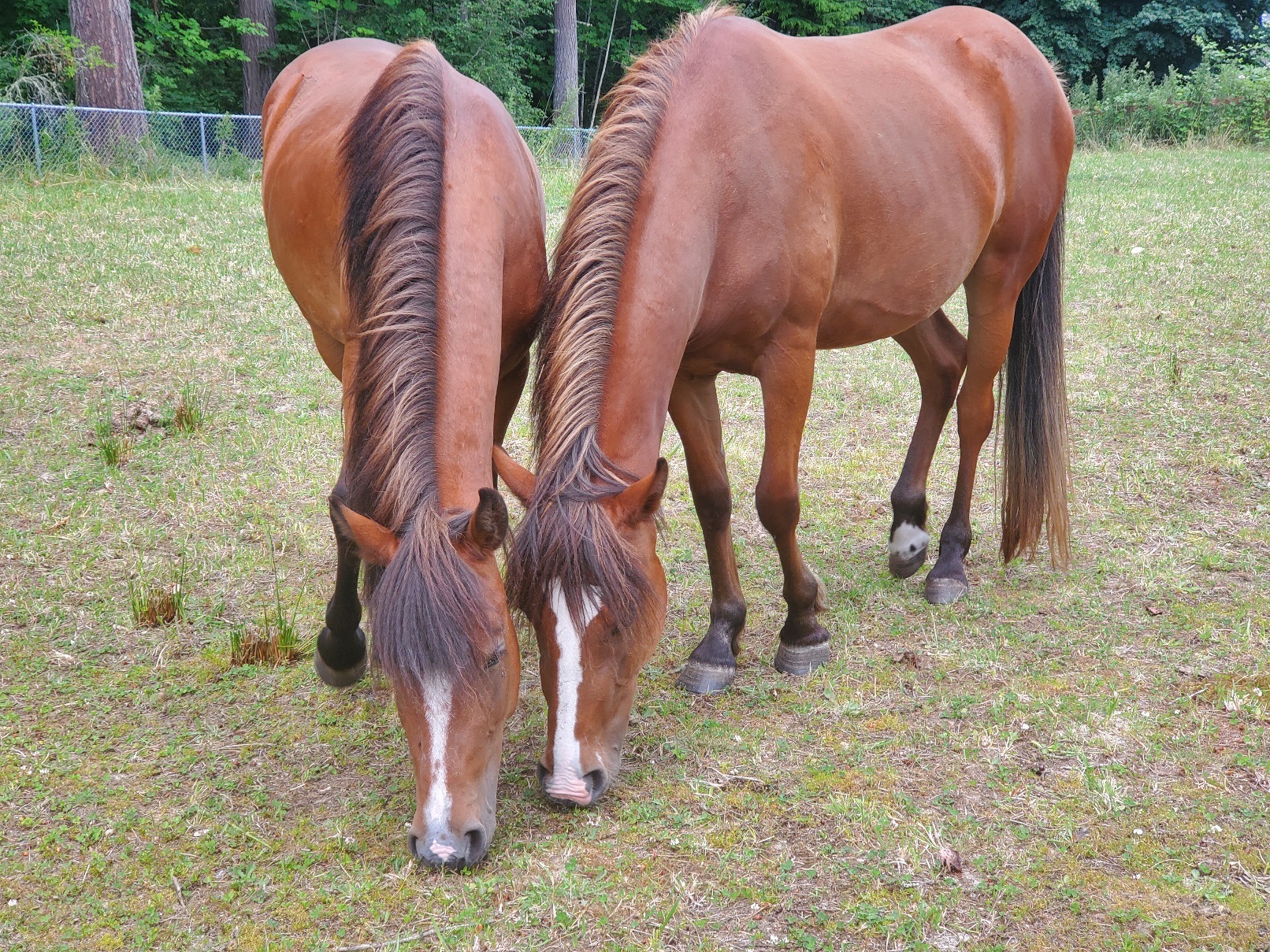
Greetings from Gig Harbor!
Pepper and Tilt have been spending time in Gig Harbor with a wonderful foster family. Lisa Garr, one of our volunteer riders, lives in Gig Harbor and stops by the foster family’s home to work with the two mares. Here’s what she recently had to say about their progress:
“While I have had very limited opportunities to get out to work with Pepper and Tilt since October, the time that their foster family has been putting into gentling and socializing these two girls is really paying off!
I’ve been out a few times in the last couple of weeks, working primarily on approaching and haltering Tilt, and the changes from the fall are extraordinary! Whereas it used to be a 5 to 10 minute game of facing up and allowing an approach, she is now exceptionally willing to hook on, allow me to approach, give her some halter-free affection, and slip the halter on. After two days of playing a little catch and release, she stayed with me and allowed me to rub the halter and rope all over her (without it on), including over her back, under her chin, and on the off side. Something that was a hard not even 3 months ago!
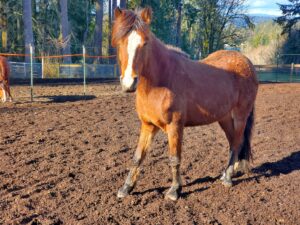 Pepper continues to be sweet, gentle, curious, and brave. Her foster family is quite new to caring for and working with horses, so unfortunately she has gotten a little pushy with her curious little mouth. But a couple of firm and respectful corrections had her remembering her good ground manners, and with a bit more consistency she’ll be a little lady once again. Pepper continues to get small lessons in understanding the flag, ropes, and burlap sacks in preparation for her future saddling.
Pepper continues to be sweet, gentle, curious, and brave. Her foster family is quite new to caring for and working with horses, so unfortunately she has gotten a little pushy with her curious little mouth. But a couple of firm and respectful corrections had her remembering her good ground manners, and with a bit more consistency she’ll be a little lady once again. Pepper continues to get small lessons in understanding the flag, ropes, and burlap sacks in preparation for her future saddling.
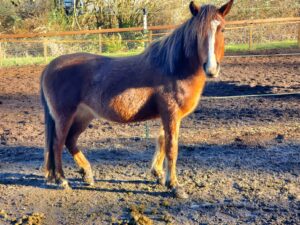 Tilt has excellent ground manners and is progressing nicely with some basic groundwork to help free her feet and find balance. Due to lack of experience and therefore confidence in the foster family, I redirected my limited time to work on catching her so they could halter and groom her more regularly.
Tilt has excellent ground manners and is progressing nicely with some basic groundwork to help free her feet and find balance. Due to lack of experience and therefore confidence in the foster family, I redirected my limited time to work on catching her so they could halter and groom her more regularly.
Both Pepper and Tilt are lovely for the farrier and love a good “spa day” where we just take some good time to curry them, give good scratches, and brush out their INSANELY THICK AND GORGEOUS manes and tails. These girls are not for the grooming-faint-of-heart!”
Pepper and Tilt will soon be making their way back to Safe Harbor Stables, where Pepper will join our horsemanship program and Tilt may be on her way to being adopted!
Working with Tilt
Here at SAFE, Dylan has mostly been working on leading and helping Tilt be less touchy about the end of the lead rope and the flag. He says she’s doing really well and she really seems to look to him for support. Today, for the first time ever, they left the paddock to go on a walk and left Jill! Both horses were super calm about it.
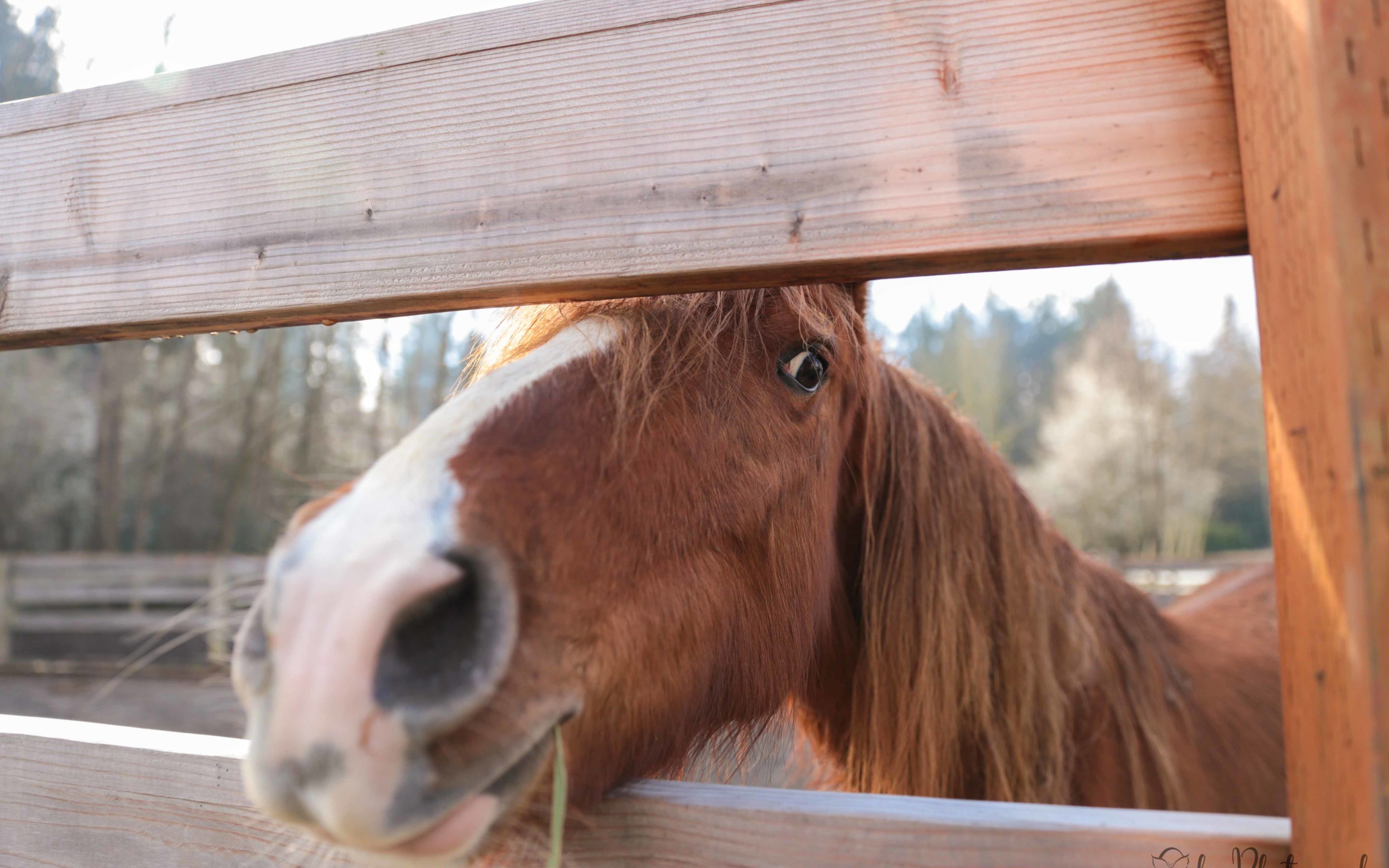
Fall City 40 Update
We started back in June with 40 horses…and we could not be happier that 30 of those horses are now in new homes, getting the care they need and deserve. That leaves ten horses who still need homes. You’ll notice that on the last update, we said that 11 horses are still available…things have REALLY slowed down with placing these horses. A couple adoptions fell through…the weather got ugly…and the public’s attention turned to other matters. Of course we knew we were in this for the long haul, but it’s been a while since we’ve even seen a good application for one of these horses. We’re really hoping that things will start to pick up now that the days are getting longer again. These horses are ready to start their new lives; are you ready to take one on?
For more on the Fall City 40, visit mayday.safehorses.org
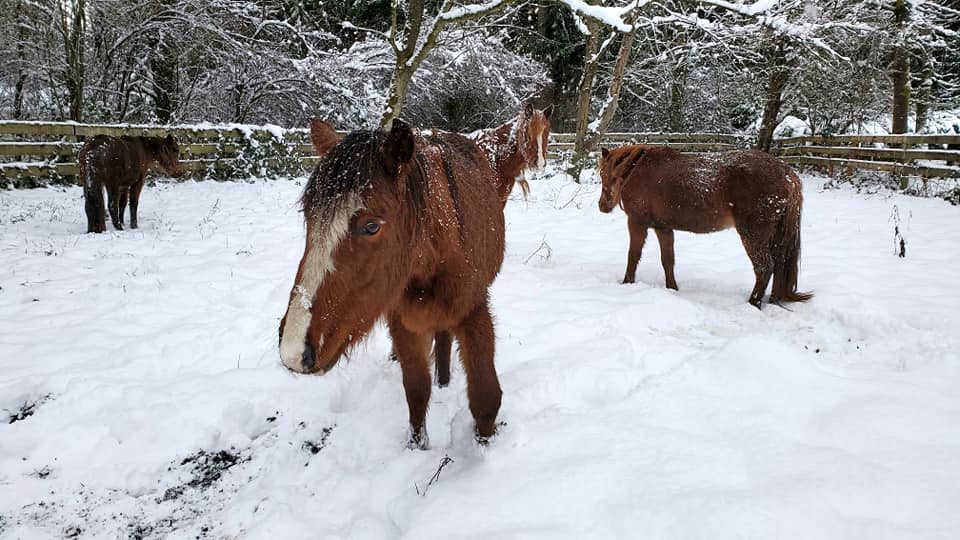
Fall City 40 Horses Update
If we’re being completely honest, taking on 24 wild horses in the dead of winter seemed like an impossible task, even to us. But we have successfully placed 11 of the seized horses into good homes with experiences handlers, and two more leave this week. That leaves 11 horses that are still available for adoption. Six of these horses are in foster homes where they are being handled, gentled, and halter-started. The other five are now at SAFE. We have handsome stallion Arty Shaw, and a group of four fillies. All five are getting accustomed to the presence of humans. They’re shy, but we’re encouraged to see that all of them are curious and interested in interacting with us. We’ve also noticed something wonderful: now that the four young mares do not have to worry about getting enough to eat, they spend time together playing like little kids. Here are some videos we captured during the recent snow:
Homes for the remaining 11 horses are still needed. If you have experience with unhandled, wild horses, please consider giving one of these beauties a home! Submit an adoption application here Adoption Application
Fall City 40 Update
It’s been about a month since the remaining Fall City 40 horses were seized in Enumclaw. These 24 horses have all been signed over to SAFE now, so we have full responsibility for their housing, feeding, and vet care, and we are taking steps to find homes for as many of them as possible. We are so grateful for the support we are receiving from this community to help us manage this huge rescue effort! It’s a lot of work, but with your help, we are making big changes for these horses!
Keep up to date with the horses at their website: http://mayday.safehorses.org
With regular feeding, the horses are starting to look and feel a lot better. There are some really nice looking horses in this group with cute markings and decent conformation. We’ve even discovered some unexpected athletic ability (like jumping!) in one or two of them. Most of them at least seem open to the idea of sharing the world with humans, and are becoming more gentle already. Wild horses are a challenge, to be sure, but most of these horses were born into this herd, not in the wild, but not exactly in captivity either. So we hope the young ones especially will make an easier transition from wild to domesticated.
As of this moment, six of the 24 horses — four mares and two colts — have been moved to new homes. Several of the remaining horses are in the process of being sent to foster care with experienced trainers for gentling, which will make them much easier and safer to place into adopt. All of the stallions will soon be gelded, and we’re finding adopters who can take in mares who are likely to be pregnant. Progress is being made.
But this is a tough time of year to be placing horses, and these are horses who are especially tricky to place. So we still need our community’s help with this rescue effort. Specifically, what we need includes:
• adopters who have experience with wild, unhandled horses
• trainers willing to foster and gentle one of these horses so we can place them more easily
• donations for the considerable cost for care, feeding, housing, vet costs, and transport of these horses
• people keeping an eye out for the missing mare, stolen by the owner, and for other groups of horses possibly owned by the same individual
We’ve also received some questions about the group of horses located in Auburn WA that were owned by the same person who owned the Fall City Forty. Those horses, about 50 in all, now belong to the owner of the Auburn property, and she is offering them for sale at $800 per horse to try to recoup her losses. There are several ponies, mini horses, and foals in this group, several colored horses as well. We believe that these horses came from feedlots and auction houses, so they are not wild horses. But they have not received much handling in the last year, so they will still need gentling and training. If you are interested in buying one of these horses, contact Dee Bowman at BnGRanchLLC@gmail.com SAFE has offered to cover the cost of gelding any of the stallions in this herd on behalf of their new owners.
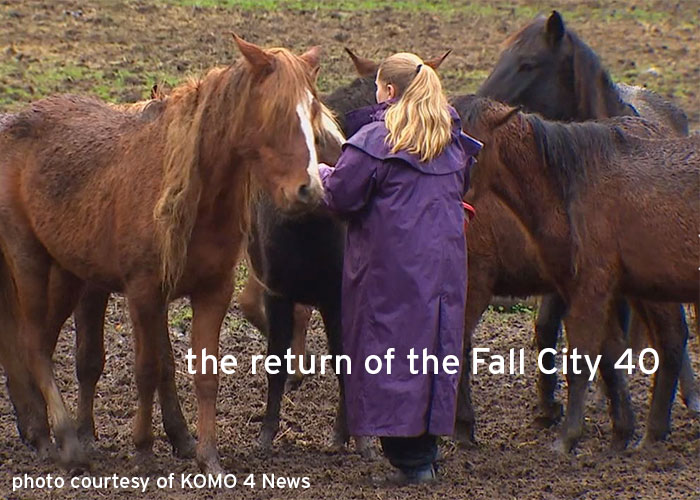
Horses Rescued in Enumclaw
Answers to FAQs
• yes, these are the horses we called the Fall City 40
• these horses are in a secure location, with food, water, and shelter
• these horses are in sheriff’s custody now, but will be signed over to SAFE soon
• SAFE is covering the cost of their board, feed, and vet care with money raised for the Fall City 40
• these horses will be available for adoption to people who have experience with unhandled horses
• stallions will be gelded prior to adoption and adopters will be responsible for after care
• visit http://mayday.safehorses.org for further updates
As was reported on several local news outlets over the weekend, SAFE was involved in a large seizure of horses by the King County Sheriff’s Office. At this time, all we can say is that the horses are in a safe and secure location with food, water, and shelter, and that they will be held there pending this active cruelty investigation. SAFE has taken on responsibility for the cost of their shelter, feeding, and vet needs, and is covering those costs with funds raised during the summer for the rescue of the Fall City Forty. We are accepting donations to our general fund for ongoing needs of all the horses in our care. We thank you sincerely for your support with this operation and your sincere concern about the well-being of these animals.
If you know the location of any other horses belonging to the individual mentioned in the news stories below, please contact us immediately, and we will pass that information on to the King County Sheriff. It’s vitally important that any remaining horses belonging to this person are tracked down and accounted for. Thank you for your help with this effort!
More information on this case:
KIRO TV story: https://www.kiro7.com/video/?id=4802680
KING TV story: https://www.king5.com/article/news/local/king-county-horses-rescued-enumclaw/281-c4c10b75-cdba-4d28-bf0a-db34d75a1176
KOMO TV story: https://komonews.com/news/local/22-horses-seized-as-king-co-investigates-nonprofit-for-animal-cruelty
Q13 TV story: https://q13fox.com/2019/12/09/22-horses-rescued-from-horrid-living-conditions-in-enumclaw/
Redmond Reporter: More than 100 horses are being hoarded by a nonprofit in Puget Sound
Placeholder
Redmond Reporter: More than 100 horses are being hoarded by a nonprofit in Puget Sound
Under guise of nonprofit caring for rescued horses, allegations of animal cruelty arose.
By Aaron Kunkler and Ashley Hiruko
Friday, September 6, 2019 8:30am
No one really knows how many horses Sharon Hunter has. Hunter, who owns and operates the Hunters Wind Wild Horse Rescue, had as many as 120 horses in two separate herds at one time. She stowed them on properties in Puget Sound counties.
Hunter’s Redmond-based nonprofit was founded in 2015, with just more than a dozen rescued horses from the Yakama Nation reservation in Eastern Washington. Since then, several of her horses have been seized by authorities alleging neglect in three counties, and in two counties horses have been euthanized. Horse advocates believe she may have more.
The nonprofit’s impact can be felt beyond the mossy pastures of King, Snohomish and Pierce counties. It stretches across the country to horse rescues in the Louisiana flatlands and in the dusty kill pens of Texas — the last stop for unwanted horses before slaughter.
Whether Hunter’s nonprofit is a net positive depends on who you ask.
(When contacted by phone for this story, Hunter hung up. She did not answer a follow-up phone call and an email received no reply. The civil attorney representing Hunter has not returned a request for comment as of the Reporter’s deadline.)
A Good Start
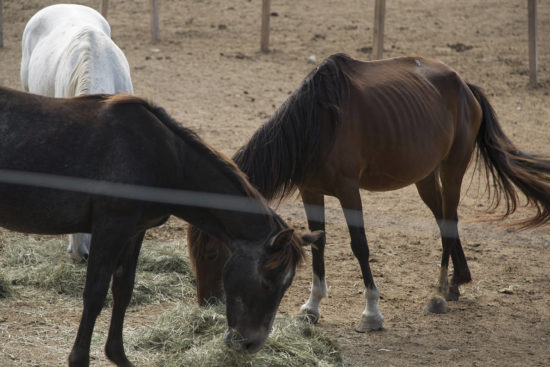
One of Hunter’s herds, located in King County, is fed a batch of hay. Horses, like these, are being housed on properties in numerous counties. Landowners allege that their owner hasn’t provided enough food or medical attention. Ashley Hiruko/staff photo
Hunter originally appeared in pages of the Redmond Reporter in 2015, when she started rescuing horses with her daughter Brandelyn and her son-in-law Joe Tafoya. Hunter’s family had been rescuing horses for about two decades and in 2015, Hunter took in 13 wild horses from the Yakama Nation reservation.
Before they were rescued, the horses were slated to be shipped abroad — either to Canada or Mexico — and slaughtered for their meat, Hunter said. And the conditions the horses faced in the industry’s kill pens were horrific. While Hunter was originally planning to take in two horses, she ended up rescuing 13.
The horses arrived in generally poor shape, and the family said they provided medical care. Two mares arrived pregnant, but one of the colts didn’t survive. It had been born with too many health problems, Hunter said.
“He had lots of love,” she said in 2015. “We named him Black Beauty.”
Hunter’s plan at the time was to rescue, rehabilitate and release the horses. She said she was working on securing a 14,000-acre plot of land in Oregon for a horse sanctuary. Joe Tafoya was trying to get Washington state to permenantly end horse slaughter and close the kill pen industry pipelines.
But at some point in the last four years, the relationship between the Tafoyas and Hunter soured and the herd multiplied. Joe Tafoya said he and his wife no longer have regular contact with Hunter.
“My wife and I continue to rescue horses on our own privately. When [the Reporter published] the article, Sharon had actually just brought those 13 horses on my property and we were trying to get involved to help. Shortly after, we figured out that we wouldn’t be able to help or work with her,” Joe Tafoya said in an email.
By 2019, Hunter’s herd had swelled in size to at least 120, with known herds at a spot in Snohomish County and one in Auburn. Another was in Fall City this summer, before being relocated to Enumclaw. At least one cluster was in Pierce County. Court documents from King and Snohomish counties indicate that several of the horses also were purchased from kill pens before they could be slaughtered abroad.
Kill Pens
Far from the Pacific Northwest, Angels Grove Ranch sits in the wooded southeast of Louisiana — about an hour’s drive north of New Orleans, across the Lake Pontchartrain Causeway. Court documents show that Hunter had boarded 10 horses with Lisa Massimini’s Angels Grove Ranch and Horse Rescue.
Massimini said horses she boarded, belonging to Hunter, were brought over by someone previously boarding them in Texas.
An investigation report from King County stated that a detective contacted Massimini, who said Hunter had made a down payment for boarding and care of the horses in August 2017. Between that time and the end of January 2018, she said she hadn’t received any additional payments during the five months of care. Eventually, Hunter paid the boarding fees and the horses were picked up by a hauler from her Louisiana ranch.
“I don’t really know where they went after me,” Massimini said.
Several of Hunter’s horses originally came from the south, and in particular Louisiana and Texas. Both states have notable horse kill pens that funnel horses to be slaughtered abroad. The U.S. essentially outlawed the practice of slaughtering horses about 12 years ago when the U.S. Department of Agriculture’s annual funding to inspect domestic horse slaughter facilities was cut. The soft ban requires annual approval from Congress, which has been renewed each year except two.
The soft ban basically prohibits the USDA from inspecting horse processing plants, and meat can’t cross state lines without the inspections. But instead of ending horse slaughter, it simply created an industry known as kill buying — where buyers pick up unwanted horses and ship them to either Canada or Mexico. Across the border, they are slaughtered for meat.
Many of Hunter’s horses may have been bought with the intention of saving them from kill buyers, including the ones Hunter seemed to have purchased and then boarded at Massimini’s rescue. Snohomish County court documents list some of Hunter’s horses as coming from Bastrop, Louisiana, home to what Massimini called a notable kill lot.
“Really if you want to dig deep … It’s people like Sharon that are trying to get horses so they don’t cross the border and they don’t die,’” Massimini said.
However, Massimini said she was unaware of what Hunter did with the horses in Washington state, or how the herd Massimini boarded was treated when they left her care.
Craig Downer runs The Wild Horse Conspiracy, a Nevada-based organization focused on preserving wild American horse lineages. Downer wrote a message in support of Hunters Wind Wild Horse Rescue on Facebook, which was shared by the rescue.
When contacted by the Reporter, Downer said he hadn’t seen the herd in person, but was particularly interested in the Yakima horse lineage. Proper breeding, he said, was essential to preserve the herd’s genetics. Downer said he learned of Hunter’s rescue after she reached out to him on social media some years ago.
“I don’t claim to really know for sure,” Downer said. “Her heart seemed to be really for the horses… that was like No. 1, and (she was) willing to sacrifice her own comforts and money and everything to help these horses. I do believe that.”
The Humane Society tracks horses that pass through kill pens to be slaughtered abroad. In 2018, about 80,000 horses met that fate, with most heading to Mexico, said spokesperson Keith Dane. A horse can fetch some money, but mostly nets less than $1,000 a head from a slaughterhouse.
Kill pen operators often market the horses to concerned horse owners and rescues before shipping them off. Kill pen operators give people an ultimatum: buy the horse or let it get packed onto a crowded truck and slaughtered abroad for a profit.
While the low price for a horse sent to slaughter means it’s not a terribly lucrative industry, about a dozen large operations exist, Dane said. Smaller operators are working across the country too.
“The Midwest is sort of like the epicenter of where these kill pens are located,” he said.
The Humane Society supports the Safeguard American Food Exports Act, which if passed by Congress, would permanently outlaw horse slaughter in the United States and prohibit shipping horses abroad to be slaughtered. Dane argued that horses currently slated for slaughter could find homes in the United States. Dane points to the fact that in 2012, about 160,000 horses were being shipped to slaughter, twice as many as last year. If the United States could handle those 80,000 horses, it could provide for the other half, he said.
Other groups, such as the Animal Welfare Council, have penned opinion pieces questioning whether laws like the Safeguard American Food Exports Act would help.
“Surely swift humane euthanasia at a [government] regulated and inspected processing plant is a kinder end than starving to death,” the council wrote on its website.
It’s worth noting, however, that both Massimini and Downer said they were unaware of the felony animal cruelty charges Hunter is facing in King and Snohomish counties (as many as 10 charges). Pierce County also has an active investigation looking into Hunter.
Abuse Allegations
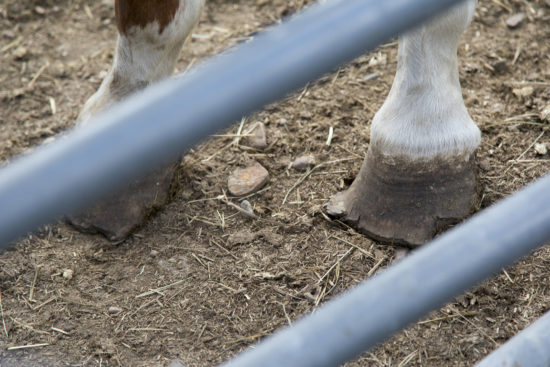
Horse hooves need to be trimmed on a regular basis and is a major task involved with horse management. Improper management of a horse’s hooves can lead to lameness. Ashley Hiruko/staff photo
On Feb. 5, 2018, Snohomish County Animal Services received a complaint about six troubled horses located on a property off of 153rd Avenue Southeast, about halfway between Maltby and Duvall. The report was made by the daughter of landowners who said they were approached by Hunter to board and lease at their pasture and barn. At first, two miniature horses and two full-size horses were brought to the property in January 2018.
The landowner had concerns about the animals’ health and asked Hunter to have a veterinarian visit. Court documents allege Hunter failed to do so. Animal control services obtained a search warrant, which allowed a veterinarian to examine the then six horses alongside law enforcement.
One pony named Lil Patches was found lying in his own feces and urine, unable to stand. The black-and-white pony was severely underweight and had chronic, untreated laminitis (an inflammation of the foot). The pony only stood on his own after receiving pain medicine.
Snohomish County seized Lil Patches, along with Miracle, a quarter horse mare with an untreated old wound that developed excessive tissue and blood vessels. Authorities also took Goldie, a palomino mare who was also severely underweight. It appeared Goldie was anemic and had a skin infection covering her entire body. These horses needed immediate medical attention, according to Snohomish County District Court documents.
The other three horses — Warrior, Willow and Princess — were in somewhat better shape and stayed on the property.
Snohomish County Animal Services manager Debby Zins said one horse was euthanized because of her condition. Another of the seized horses was initially rehabilitated and adopted out, but wound up being euthanized too. Only the third seized horse is still alive.
After the Snohomish County action, Hunter disappeared with her remaining three horses, moving them off the property to an unknown location, Zins said. The Snohomish County horses were originally moved to the 153rd Avenue site to avoid scrutiny from King County law enforcement, following a civil citation for animal cruelty, she added.
“We encourage anyone who knows where she is keeping horses, or if anyone has any of her horses or is concerned for her horses’ care, to please reach out to their local animal control agency,” Zins wrote in an email.
Later that month, Hunter was charged with six counts of second-degree animal cruelty in Snohomish County. If convicted, the felony counts would bar her from owning horses for a length of time determined by a judge. Her trial is scheduled for this month, but a continuance is possible.
Zins said she believes Hunter’s horse-centered nonprofit doesn’t function like others, in which horses are rehabilitated and then adopted out. Zins is only aware of Hunter collecting horses.
“Sharon Hunter is horse hoarding. Hoarding cases are complex and it is very difficult to break that cycle. She appears to be dedicated to her purpose, but is ill equipped to care for the animals and as a result many horses are neglected and suffering,” Zins wrote.
King and Pierce County Horses
Tim Anderson, lead animal control sergeant for Regional Animal Services of King County (RASKC), has been investigating Hunter’s Auburn herd of about 80 animals. The herd is in addition to another, known as the Fall City 40, which was moved to Enumclaw, and the Snohomish herd.
On Aug. 2, King County investigators moved in to inspect the Auburn herd, housed on a roughly 17-acre property. Four horses were ultimately seized.
Following that, Anderson said four civil notices of violation were issued on Aug. 17 for $500 each. The citations acted as the basis of four counts of second-degree animal cruelty charges recommended to the King County Prosecuting Attorney’s office on Sept. 1, Anderson said. However, the Reporter was not able to confirm those charges at the time of publication with the county prosecutor. If the charges are confirmed, it would bring the total number of felony charges Hunter is facing to 10.
In addition, Anderson said, a separate notice King County served Hunter on Aug. 17 would bar her from possessing horses within county lines for four years. She has about a month to comply or appeal. If not, Hunter could be fined $1,000 per day, per horse that is found in King County.
“She certainly has a lot of horses, more horses than she appears to be able to care for,” Anderson said.
The Auburn herd has dwindled to 65 from its peak of 80 after RASKC seized several horses and others were relocated to other properties. One of the horses was euthanized.
The pastures of the Auburn property have turned to dirt, due to the 65 horses housed on about 17 acres. Horses generally require between one to two acres per animal, according to Stable Management, an equine professional resource.
At the Auburn site, the horses are separated by sex and type, and within the last few weeks the property owner has begun supplementing and eventually fully feeding the horses. Many of the horses have cracked or chipped hooves and are in need of farrier services, dental work, de-worming and general vet care.
The Auburn property owner, who asked to remain anonymous due to fears of compromising ongoing legal matters, said Hunter had originally asked to pay rent and board for 12 horses on the property during spring 2018, a number that steadily ballooned to more than 80 by earlier this year. She said Hunter has intermittently provided the horses with food, but not enough to fully feed the large herd. Little headway has been made on relocating the horses, the property owner added.
“She has not adopted one horse out during the whole time,” she said. “When she starts getting in trouble she starts moving them around.”
Bonnie Hammond, executive director of the Redmond-based nonprofit Save A Forgotten Equine (SAFE), said they were willing to step in if the horses were declared abandoned, following a 15-day waiting period. However, on Sept. 3, the property owner said that Hunter was planning on removing the horses over the following days. During a phone interview with the property owner on Sept. 3, more King County animal control officers were onsite inspecting another horse that appeared malnourished.
While they can inspect, there’s little animal control can do under existing state or local laws to prevent someone from owning an abundance of horses. Law enforcement can only get involved when there are reports of animal cruelty or neglect, as animal control agencies in King, Snohomish and Pierce counties allege is the case with Hunter.
Owning too many horses comes with financial and time burdens. For example, SAFE’s program only accepts 30 horses at a time. And to care for that many horses the nonprofit requires 140 volunteers, five paid staff and a budget of about $650,000 each year, Hammond said.
SAFE has been involved in stepping in to care for several of Hunter’s herds, including the one in Auburn.
“Horses are hard to take care of and you need a lot of people, a lot of money, a lot of resources to properly take care of large groups of horses,” Hammond said.
In Pierce County, Animal Control supervisor Brian Boman said four horses were seized. Details are scarce during the ongoing investigation, but they are also Hunter’s horses.
Fall City 40
The Fall City 40 herd grew from the group of 13 wild horses previously housed just east of Redmond in 2015. At some point afterward, the horses relocated to the Johann family property in Fall City, a small town west of Snoqualmie. Jamie Johann-Barney is the daughter of the aging property owners, and said Hunter initially approached them by walking up their driveway and asking if they could board horses there.
Johann-Barney said the horses weren’t properly cared for and says her parents lost significant amounts of money boarding the horses. In June, she and others staged what Johann-Barney called an intervention, asking her father to get rid of the horses.
Law enforcement wouldn’t intervene, she said. Officers told them that since the family initially agreed to board the horses without a contract, it was a civil matter. SAFE, which later got involved, said the horses were allowed to breed freely, were not being fed, not receiving veterinarian or farrier care and not being adopted out.
“It was horrible,” Johann-Barney said.
According to SAFE’s website, the Johanns wanted the horses gone, but Hunter wouldn’t remove them. The Johanns sent a notice to Hunter in June saying she had 15 days to remove the horses or they would be considered abandoned. When the horses weren’t removed, the Johanns contacted SAFE, which helped get the horses healthy and assisted in their adoption.
The nonprofit provided hay, photographed and cataloged the herd, and tried to attract adopters, according to a post on the organization’s website that was also confirmed by Hammond.
Of the 40 horses, 15 were adopted out to new owners. But then an attorney representing Hunter served the Johanns with a cease and desist letter, demanding they stop trying to adopt out the horses. Hunter was also seeking to reclaim the horses in the letter. In the face of a possible lawsuit, the property owners decided to let Hunter remove the remaining 25 horses. Hunter also sent SAFE a similar letter demanding the 15 horses back that had been adopted. SAFE declined.
The remaining 25 from the herd were moved to another location, likely in Enumclaw, Hammond said.
“The truth is that she’s got groups of horses that she’s just shuffling from one place to another. Either she gets thrown off a property, or law enforcement’s getting too close or what have you,” Hammond said. “She’ll tell stories about saving America’s wild horses and all this really romantic stuff. But in truth, she’s just stockpiling them and they sit and they fight with each other and the stallions breed with the mares.”
Hammond was clear in what she would like to see happen.
“I would like her to stop acquiring horses,” Hammond said. “She needs to stop doing this and the scary thing is, there’s still plenty of horses out there. She could get them from the auctions by the truckload.”
A Hard Question
The situation presents a complex question: Is it better to let a horse bound for slaughter to die, or be adopted by individuals or organizations that are not fully equipped to care for the animals?
On the Auction Horses website, a plea is made. The message stands out from the rest of the content. Written in a bold font, in red letters at the top of the website, it reads: “Please NO fundraising for the purchase of horses.”
For Auction Horses, a Washington- and Oregon-based network of people who work to prevent the auction and slaughter of the animals, the message is an important one for the betterment of the animals, advocates say.
“People think, ‘Oh I’d like to give $20 to this good cause’…but if they don’t know where the horse is going and don’t know the person or their resources available to take care of the horses, they have no idea of the kind of situation they’re contributing to,” said Tash Johnson with Auction Horses.
Caring for a horse is a heavy endeavor. Costs are typically in the hundreds per month, and if the animals aren’t fed enough and their feet trimmed every six to eight weeks, horse health can decline.
“If you have 120 horses and you’re trying to feed them and take care of them, it’s an incredibly difficult task,” Johnson said. “Even taking care of them with staff.”
And things can get much worse in the winter, she said, when horses need extra food in order to stay warm and rain turns their pastures into mud pits. Attempting to move large bales of hay — generally 50 and 100 pounds each — becomes difficult in the rain, and hooves not properly cared for can become infected from feces on the ground.
“That’s what happens to neglected horses in Western Washington,” Johnson said.
She learned of Hunter when she relocated some of her horses to Redmond. Johnson’s horses stayed on a property nearby. Johnson said seeing a herd of horses with intact stallions and no separation from mares raised red flags.
When the man whose property Hunter’s horses were staying on started asking for help on the Auction Horses website, the red flags turned into “full-scale alarm,” Johnson said.
But she said having animals shipped off to slaughter is an “absolute failure.”
Johnson has seen every kind of horse end up on feedlots, the final stop before the slaughter: Champion horses sold when the summer ends by owners avoiding financial support during the winter; trail horses; best-of-the-best show horses; brut mares that could no longer get pregnant; ponies and draft horses and even young, healthy horses that went untrained.
She said the best practice for those concerned about the animals’ well being is to prevent them from getting to pens in the first place. Once there, the horses can become injured as they are mingling with dozens of other animals. And illness is brought in from different places. Johnson described the transportation of horses to slaughter, the way they’re handled, loaded into crowded vehicles and the slaughter pipeline as “horrific.”
“Rescue horses from Craigslist or posted on feed boards,” she said. “Save them before the kill pens. Once they’re in the kill pen, if there’s a good home for them, by all means save them. But if there isn’t, honestly, I would rather see them go to slaughter than suffer.”
Link to article online: http://www.redmond-reporter.com/news/more-than-100-horses-are-being-hoarded-by-a-nonprofit-in-puget-sound/
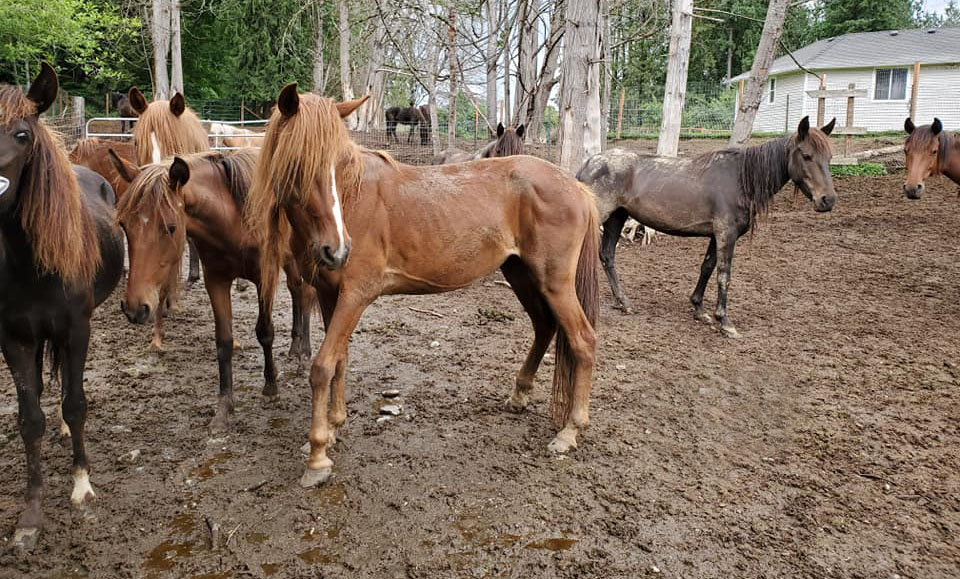
Fall City Forty: the Full Story
We’ve had to stay pretty quiet about the situation with the Fall City Forty for two reasons. One, because we were being threatened with legal action for our involvement in this rescue mission; and two, because we were holding out hope that we would be allowed to return to the Fall City property and continue caring for these horses. We feel it’s time to let our community know what happened, and what is continuing to happen.
First, some background. The horses we called the Fall City Forty were wild horses, originally rescued from Yakima. There were between 14 and 23 horses in the original herd, but because stallions and mares were turned out together and allowed to breed freely, the herd grew in size to the 40 that we encountered last June. While the owners of the Fall City property had originally agreed to let some horses live there temporarily, the situation had grown well out of hand: horses not being fed, not receiving vet or farrier care, not being gentled, handled, or trained, not being adopted to new homes. These horses were just being stockpiled, and all the while their owner was collecting more and more horses from auctions and feedlots.
The property owners wanted the horses gone, but their owner would not remove them. In late June, the property owners had a lawyer send notice to the horses’ owner that they had 15 days for the horses to be removed, after which time they would be considered abandoned under the law. The horses were not removed within the time allowed. The property owners then invited SAFE to come in and assist them in finding new homes for the 40 horses.
On behalf of the property owners, SAFE came in and began working with the horses. We had tons of hay delivered to the property so the horses could be fed 2–3 times per day. We photographed and cataloged the herd, and put the word out that we were looking for people who had experience with unhandled horses who might be willing to adopt them. And we began taking first steps toward gentling these wild animals and helping them become accustomed to being around humans.
Public support for this rescue effort was tremendous. Over 350 people made donations to help these horses and we received adoption applications from more than 40 people. We carefully selected those that that had prior experience working with wild, unhandled horses, and who had the resources necessary to provide regular and sufficient feed, veterinary and farrier care, and training. We conducted phone interviews with candidates to learn more about them and pair them with suitable horses from the herd. We did reference checks with veterinarians, trainers, and personal references. And we evaluated the suitability of new homes with photos and videos taken on site.
One week after we began working with the Fall City horses, a cease and desist letter from an attorney representing the horses’ previous owner was delivered to the property. The letter was addressed to both the property owners and to SAFE, and demanded that we cease our rescue efforts immediately. Because the property owners had taken the necessary steps to establish the herd as abandoned, we were not overly concerned about the cease and desist demands. But for our protection, we hired the same lawyer who drafted the 15 day demand letter for the property owners to represent SAFE, and we continued with our work on their behalf.
The next week, with the help a wonderful group of horsemen and women, we began preparing these horses for the next step in their journey towards better lives. Over the course of two days, 15 of the 40 horses were safely and calmly loaded onto trailers and sent off to new homes. Those who stayed behind continued to be gentled. We began strategizing the best and safest way to geld the many mature stallions who remained. This itself was not an easy problem to solve, but given time, we were confident that these stallions would no longer be capable of bringing more unwanted horses into the world.
It turned out that time was the one thing we no longer had. With the rescue operation in full swing and great progress being made, we were informed that rather than risk a lawsuit, the property owners had decided to try to settle with the horses’ former owner, and allow that individual to take the horses back. Although they were satisfied with the work that SAFE had done and the incredible progress we had made in a very short time, the property owners were no longer willing to fight for the well-being of these horses.
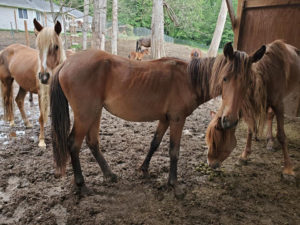 This was a crushing blow. It wasn’t just the work or the money that we put into this rescue effort. We’d come to care a great deal for these horses. We’d gotten to know them, given them names to suit their personalities, and started to earn their trust. We were deeply invested in helping all of them get new homes where they’d no longer go hungry. And we were SO CLOSE. The horses were getting healthy with regular feedings. We were winning the confidence of the shyest among them. We had more approved homes for them to go to, with people who genuinely wanted them. It was all going so well…and then it all came to a crashing halt.
This was a crushing blow. It wasn’t just the work or the money that we put into this rescue effort. We’d come to care a great deal for these horses. We’d gotten to know them, given them names to suit their personalities, and started to earn their trust. We were deeply invested in helping all of them get new homes where they’d no longer go hungry. And we were SO CLOSE. The horses were getting healthy with regular feedings. We were winning the confidence of the shyest among them. We had more approved homes for them to go to, with people who genuinely wanted them. It was all going so well…and then it all came to a crashing halt.
Immediately after the property owners gave up the fight, the attorney representing the horses’ owner came after SAFE, demanding the return of the horses that had been placed on behalf of the property owners and threatening lawsuits against us if we did not comply. We did not comply.
As for the rest of the Fall City horses, we held out hope until the very last minute that somehow we would be allowed back in to help them. But it was not to be. Our attempts to convince the horses’ owner to allow us to find new homes for the Fall City horses were ignored. And last week, their owner was able to move them to a new property. They remain in King County. They’re back to having to rely on their owner for care. Maybe this time things will be different…but based on past history, we remain very concerned about the well-being of these horses, and the many other horses owned by this same individual.
Thanks to the many people who helped with the Fall City Forty, we can take comfort in the fact that 15 of those 40 souls are safe. There is another large group of horses on a property in Auburn belonging to this person and we’re told that they are in the process of being evicted. So if you or someone you know is approached by someone looking for help to quickly move a large group of horses, please feel free to contact us for advice.

